Mitchell Hadley's Blog: It's About TV!, page 55
April 8, 2023
This week in TV Guide: April 9, 1955

 When I was a kid playing with model trains, there was a line of accessories that you could use to build your own village, complete with stores, factories, and even a depot. It was called Plasticville, and it was (and is; it's still around) pretty cool. But can Plasticville possibly compete with Videotown, U.S.A.?
When I was a kid playing with model trains, there was a line of accessories that you could use to build your own village, complete with stores, factories, and even a depot. It was called Plasticville, and it was (and is; it's still around) pretty cool. But can Plasticville possibly compete with Videotown, U.S.A.? Videotown is also known as New Brunswick, New Jersey, a community of nearly 40,000, which has been studied—"relentlessly scrutinized," as Frank De Blois calls it—for the last seven years to find out the impact TV has had on the community, "and, by extension, on all the rest of us." The raw figures tell us that 83 percent of families in Videotown own televisions (compared with 64 percent who own cars, and 80 percent with telephones), that the average size is 21 inches and that the family room is built around it, that 74 percent turn on the set at least once a day, and that the longer they have a set, the more they use it—at least three hours a day. What those numbers don't tell us is the effect television has had on these people. That is what we're about to find out.
It all started in 1948; there were 267 sets in the town at that point, and because of its proximity to New York City, the advertising firm of Cunningham and Walsh decided to launch their study. One of their initial conclusions was that, interestingly enough, television brought families together. "Children stopped playing stickball in the street. Parents quit going to the movies. Bowling leagues broke up. Even the sale of comic books went down. Result: the living room once again became the social center of the family." Said one mother in 1950, "We all stay home now. TV is wonderful." Women began doing their daily routine early in the morning, so they could get to watching TV. "It takes up so much of my time," one woman confided, "that I don't have enough left to do my housework."
Since then, things have evened out a bit; "[P]eople began to go out to the movies again, to read books and magazines once in a while, and to get back into the bowling league. Even radio made a comeback." Even so, people continued to watch as much TV as ever: "Monday through Friday nights husbands total 13.3 hours; wives, 13.8 hours; kiddies 7.7." The conclusion, according to the firm's research chief Gerald Tasker, was that "for one thing, most viewers had completely stopped visiting their friends." When television first came along, one housewife recalls, "our neighbors used to come in every week and look at Milton Berle with us. But now they got the TV too—and whenever Milton Berle goes on, why, me and Pa just sit there and watch him all alone." Sure enough: whereas 25 percent used to go visiting or entertain, the number has now dropped to 10 percent. And that's how they can continue to go to movies, go bowling, read, or listen to the radio. Those who go out have simply traded one kind of socializing for another, but for those who don't leave the house at all, it's just them and their TV.

One of the broad conclusions that everyone seems to agree on is that people love their TVs ("It's the greatest thing in the world!"), and they'd hate to go without it. ("We'd rather hock the ice box.") The rest of the results are, as you might say, mixed: TV either starts or stops fights, it's good or bad for the eyes, it's better or worse than radio, and so on.
It's hard to draw a direct parallel between 1955 and today, thanks to social media; you'd have to compare the number of hours people watched television back then with the number of hours they spend looking at their screens now. There are other differences; the multiplication of options and the introduction of various options for on-demand viewing mean that television—media, we have to call it—is no longer a unifying experience, with people watching the same shows at the same time. What it has succeeded in doing is isolating people, not only from their neighbors but from their own family members, as everyone retreats into his or her own virtual world. And it's trivialized so, so much; I do wonder if everyone still thinks of television as "the greatest thing in the world."
On my reading list is Neil Postman's provocative Amusing Ourselves to Death: Public Discourse in the Age of Show Business , which I expect is going to have a lot to say about the effect television has had on our society. Once I've read it, you can be sure I'll be back to this subject. Maybe Videotown, U.S.A. is just another Plasticville after all.
l l l
Here's something for my friend Hal Horn at The Horn Section: a profile of Bob Cummings, the "up and coming" star of The Bob Cummings Show, better known as Love That Bob. He's also the star of My Hero, which is currently in reruns and scoring healthy ratings. And he's also "a man endowed with a talent for spinning yarns so complicated and so fantastic—and yet, coming from him, so believable—that people believe them." For example, there are at least five different versions of how he came upon "Robert S. Beanblossom," the name of his My Hero character; the latest one says Beanblossom was a man who found a mechanical pencil that Cummings had lost and carried it with him for 16 years until he could return it to Cummings.
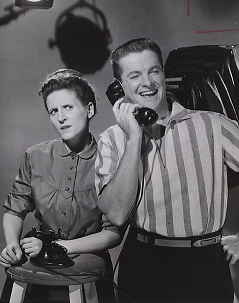 Bob with co-star Ann B. DavisCummings is considered one of the most versatile performers in Hollywood, particularly in light comedies, but he's also made several movies, a Studio One drama, and a musical for NBC. (That Studio One drama, although the article doesn't mention this, was "Twelve Angry Men," in which he played the Henry Fonda role, and brilliantly.) And he's not afraid to use his influence, either: not only does he deliver the commercials on his show, he won the right to write them as well.
Bob with co-star Ann B. DavisCummings is considered one of the most versatile performers in Hollywood, particularly in light comedies, but he's also made several movies, a Studio One drama, and a musical for NBC. (That Studio One drama, although the article doesn't mention this, was "Twelve Angry Men," in which he played the Henry Fonda role, and brilliantly.) And he's not afraid to use his influence, either: not only does he deliver the commercials on his show, he won the right to write them as well.The concept for his new show—a Hollywood photographer with an eye for the starlets he snaps—came to Cummings in an episode he wrote for My Hero; independent of that, a similar idea had also come to Paul Henning, writer for Burns and Allen. When Henning approached Cummings with the idea, it turned out that Cummings had been about to call him with the same idea. Henning is now the show's producer and its only writer. The Bob Cummings Show will run for five successful seasons, and though Bob will have two other series and will appear many times on other shows (including a memorable appearance on The Twilight Zone), audiences will never love Bob as much as they do now.
l l l
Sunday is Easter, and as is to be expected in the 1950s, television takes notice. Besides five chuch services on Sunday morning (two Catholic, two Episcopal, one Baptist for those of you keeping count at home), we have coverage of New York's Easter Parade on not one, but two stations. WPIX's ambitious two-hour broadcast, starting at 11:30 a.m., features Ed Sullivan as host and actress Haila Stoddard providing fashion commentary, plus the Georgetown Chimes a cappella group performing Easter songs, actress Patty McCormack reciting an Easter powm, Easter art fromt he Metropolitan Museum of Art, UN members talking about how the holiday is celebrated in their countries, appearances by Nancy Kelly, Don Ameche and other stars, and President Eisenhower's Easter message from Washington. Over on WRCA, coverage begins at 12:30 pm, with Ben Grauer on Fifth Avenue, Arlene Francis covering an international fashion show from the Hotel Pierre, and music from soprano Mimi Benzell and the Robert Shaw Male Chorus. Another Easter fashion show follows on WRCA at 1:00 p.m., this one from the Grand Ballroom of the Waldorf-Astoria, hosted by Tex McCrary and Jinx Falkenburg. The show's called "The World of Silk," and it's sponsored, surprisingly, by the International Silk Association.
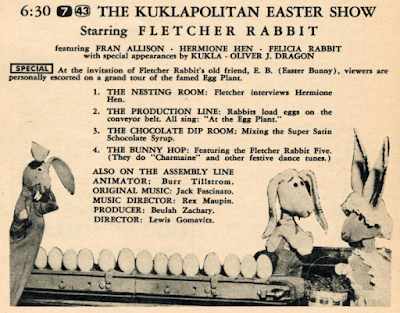 One of the day's highlights has to be The Kuklapolitan Easter Show (6:30 p.m., ABC), starring Fletcher Rabbit, with Fran Allison and the rest of Burr Tillstrom's Kuklapolitan puppets, plus a "special appearance" by Kukla and Ollie. It's an "egg-sighting" tour of the Easter Bunny's famous Egg Plant, and I think this would be a delightful show to see. The Hallmark Hall of Fame presents "Lydia" (5:00 p.m., NBC), with Sarah Churchill as a Greek pagan converted by the apostle Paul; there's also a special Easter show by Fred Waring and his Pennsylvanians on G.E. Theater (9:00 p.m., CBS) to round out the evening.
One of the day's highlights has to be The Kuklapolitan Easter Show (6:30 p.m., ABC), starring Fletcher Rabbit, with Fran Allison and the rest of Burr Tillstrom's Kuklapolitan puppets, plus a "special appearance" by Kukla and Ollie. It's an "egg-sighting" tour of the Easter Bunny's famous Egg Plant, and I think this would be a delightful show to see. The Hallmark Hall of Fame presents "Lydia" (5:00 p.m., NBC), with Sarah Churchill as a Greek pagan converted by the apostle Paul; there's also a special Easter show by Fred Waring and his Pennsylvanians on G.E. Theater (9:00 p.m., CBS) to round out the evening.l l l
There's music in the air this week as well, with a couple of specials to look forward to. Max Liebman's monthly "spectacular" on NBC is the Franz Lehar operetta, The Merry Widow, with Anne Jeffreys, Brian Sullivan, Edward Everett Horton, and John Conte heading the cast. (Saturday, 9:00 p.m.) And on Sunday, The Colgate Comedy Hour turns itself over to an hour-long adaptation of Roberta, the Jerome Kern-Otto Harbach operetta, starring Gordon MacRae, Nina Foch, Agnes Moorehead, and Jack Carter. The orchestra is conducted by Carmen Dragon, whom, we all know, is the father of Daryl Dragon, the former husband of Toni Tennille. (8:00 p.m., NBC)
 As if that isn't enough, baseball season starts on Monday, with two traditions: the Cincinnati Redlegs, the first professional baseball team, opens the National League season at home against the Chicago Cubs, while in Washington D.C., President Eisenhower is on hand for the Senators opener against the Baltimore Orioles. However, in New York the television season begins much earlier; on Saturday, WOR carries the pre-season game betwen the Yankees and Dodgers from Ebbets Field in Brooklyn (1:55 p.m., with Vin Scully on the play-by-play!). and on Sunday the two teams meet again, this time at Yankee Stadium in the Bronx. (1:55 p.m., WPIX, with Mel Allen and Red Barber) You might wonder how baseball was handled in a three-team city like New York; WOR is the hme of the Dodgers, with all 77 home games and 25 road games on the channel; the Yankees and the New York Giants both call WPIX home, with each team having their 77 home games carried. Including the two exhibition games over the weekend, that means New Yorkers will be blessed with 258 games from which to choose. And here's a footnote: all three teams start weekday night games at 8:00 p.m. or so, much later than teams do today. Fewer night games, shorter games, and less crime are your reasons.
As if that isn't enough, baseball season starts on Monday, with two traditions: the Cincinnati Redlegs, the first professional baseball team, opens the National League season at home against the Chicago Cubs, while in Washington D.C., President Eisenhower is on hand for the Senators opener against the Baltimore Orioles. However, in New York the television season begins much earlier; on Saturday, WOR carries the pre-season game betwen the Yankees and Dodgers from Ebbets Field in Brooklyn (1:55 p.m., with Vin Scully on the play-by-play!). and on Sunday the two teams meet again, this time at Yankee Stadium in the Bronx. (1:55 p.m., WPIX, with Mel Allen and Red Barber) You might wonder how baseball was handled in a three-team city like New York; WOR is the hme of the Dodgers, with all 77 home games and 25 road games on the channel; the Yankees and the New York Giants both call WPIX home, with each team having their 77 home games carried. Including the two exhibition games over the weekend, that means New Yorkers will be blessed with 258 games from which to choose. And here's a footnote: all three teams start weekday night games at 8:00 p.m. or so, much later than teams do today. Fewer night games, shorter games, and less crime are your reasons.Keeping with the baseball motif, Ed Sullivan introduces all the stars on Toast of the Town. (Sunday, 8:00 p.m., CBS) The lineup includes Willie Mays, Pee Wee Reese, Dusty Rhodes, Robin Roberts, Warren Spahn, Vic Wertz, and Jerry Coleman. The first televised regular season games are on Tuesday (Dodgers vs. Pittsburgh Pirates at 1:25 on WOR; Yankees vs. Senators at 1:55 on WPIX.) Play ball!
l l l
Some big names on Monday's shows: Robert Montgomery Presents stars Montgomery himself as Jay Gatsby in "The Great Gatsby" (9:30 p.m., NBC), which also includes Phyllis Kirk as Daisy, Ed Binns as Nick, John Newland (host of One Step Beyond) as Tom Buchanan, and Gena Rowlands as Myrtle. And at 10:00 p.m. on CBS's Studio One, Louis Jourdan stars as a Czechoslovakian hockey player plotting to defect after the Soviets take over his country, in "Passage at Arms"; Theodore Bikel is part of the supporting cast.
On Tuesday's Today (7:00 a.m., NBC), Dave Garroway interviews film producer Stanley Kramer; if Kramer's there to promote a movie (the listing doesn't say), it's probably Not as a Stranger, which comes out in June, and stars Olivia de Havilland, Robert Mitchum, Frank Sinatra, Gloria Grahame, Broderick Crawford, and Lee Marvin. Also, "[a]n armored truce is scheduled to drie up with a million dollars worth of jewels and Jinx Falkenburg inside." Whether the guards are for the jewels or Jinx isn't said.
But since this is the second mention of Jinx Falkenburg in a handful of pages, let's take a timeout for a minute. Last year, after she appeared in a TV Guide from 1951 , I noted that Jinx Falkenburg was the owner of the nightgown that Rita Hayworth wore in her famous pinup. Which is why I'm submitting this for your approval.
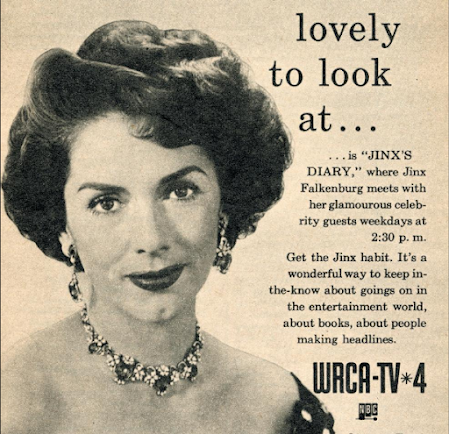
Getting back to the subject at hand, Tuesday night Wendell Corey and Keenan Wynn star in Rod Serling's "The Rack" on The United States Steel Hour (9:30 p.m., ABC). "The Rack" is a Korean War story about a decorated Army officer being court-martialed for collaborating with the Chinese as a result of being tortured in a POW camp. Marshall Thompson (Daktari) plays the young captain facing charges of treason; when the story's made into a movie the following year, the role's played by Paul Newman. The lesson remains that torture is second in immorality only to war itself.
Wednesday's Disneyland sees the premier of the three-part story "Davy Crockett, Indian Fighter" (7:30 p.m., ABC), shot on location in the Great Smoky Mountains and along the Ohio River, an impressive achievement for television. Fess Parker stars as Crockett, with Buddy Ebsen as George Russell. The Hollywood TV Teletype reports that Disney has already decided on four more Crockett films for next season.
 This month's Shower of Stars (Thursday, 8:30 p.m., CBS) is called "Show Stoppers," and it figures to deliver, with Ethel Merman, Red Skelton, Peter Lind Hayes and Mary Healy, Harold Lang, and Cindy Robbins. It's nice to see how the ad reassures us that, even if you don't have a color set yet (a status that applies to roughly most of the country), you can still enjoy it in black and white. Later, on Four Star Playhouse (9:30 p.m., CBS), Charles Boyer and Angela Lansbury star in "Madeira! Madeira!" and Charles Bickford stars in "The Woman at Fog Point" on Ford Theatre (9:30 p.m., NBC). A big night for stars, indeed.
This month's Shower of Stars (Thursday, 8:30 p.m., CBS) is called "Show Stoppers," and it figures to deliver, with Ethel Merman, Red Skelton, Peter Lind Hayes and Mary Healy, Harold Lang, and Cindy Robbins. It's nice to see how the ad reassures us that, even if you don't have a color set yet (a status that applies to roughly most of the country), you can still enjoy it in black and white. Later, on Four Star Playhouse (9:30 p.m., CBS), Charles Boyer and Angela Lansbury star in "Madeira! Madeira!" and Charles Bickford stars in "The Woman at Fog Point" on Ford Theatre (9:30 p.m., NBC). A big night for stars, indeed.I don't know why, but I noticed the debut of a program on WOR called A Man's World (Friday, 7:00 p.m.), described as "a weekly series of fashion hints for men," starring a man with the unlikely name of Bert Bacharach. And no, of course it's not the composer. It's his father .
l l l
Finally, a collection of those clever slides you used to see on your screen whenever technical difficulties would arise, which in the early days of television happened relatively often. There must have been a million of these at one time or another; these are some of them.
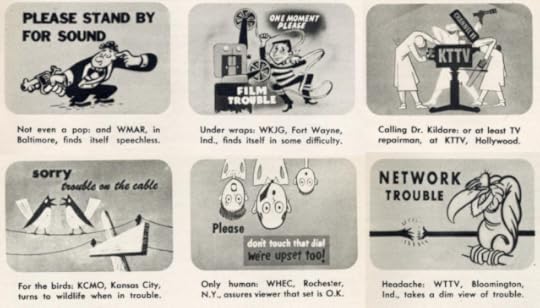
I'm sure we're all grateful that technology has become more dependable over the decades, but there's something charmingly playful that's missing from our oh-so-serious way of doing things, even as the things we do continue to seem less and less serious. The 3D, CGI graphics, slick and polished and identical no matter what or where the channel is—is there really no room for them today? As the pioneers of television might say, so uncreative. TV
Published on April 08, 2023 05:00
April 7, 2023
Around the dial
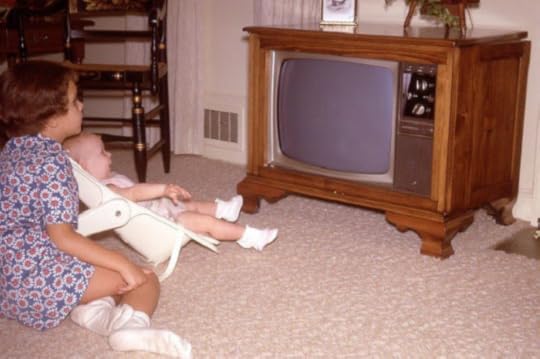
 Something I miss about today's television is the demise of the made-for-TV movie. Sure, they're all over cable stations, especially at Christmastime (those we could do without), but I mean network movies like the ABC Movie of the Week. At Classic Film & TV Cafe, Rick lists
seven classics
from the good old days. And they're free to watch!
Something I miss about today's television is the demise of the made-for-TV movie. Sure, they're all over cable stations, especially at Christmastime (those we could do without), but I mean network movies like the ABC Movie of the Week. At Classic Film & TV Cafe, Rick lists
seven classics
from the good old days. And they're free to watch!At Television's New Frontier: the 1960s, a look at the 1962 episodes of the single-season legal drama Sam Benedict , starring Oscar-winner Edmond O'Brien as the eponymous flamboyant defense attorney. This premieres in a few weeks on the Hadleyvision Monday night legal lineup, and I've been looking forward to it for some time.
It's the 300th episode of the Hitchcock Project at bare-bones e-zine, and this week Jack concludess his look at the scripts of Lou Rambeau with the 8th season story " Last Seeen Wearing Blue Jeans ," which Jack considers a "poor" adaptation of Amber Dean's novel. Poor or not, it's worth checking out, as it always is.
At Cult TV Blog, John's been looking at shows from the 1980s; next up is The Kenny Everett Television Show , a bizarre comedy sketch show starring, need we say it, Kenny Everett. I'm not going to try and explain it any more than John does; just head on over and read it.
Ever wonder how that old Indian-head test pattern worked ? Wonder no more; you can find out over at the Broadcast Archives.
At A Shroud of Thoughts, Terence has been reviewing the 100th anniversary of Warner Bros., and part three takes us into WB's involvement with television, including those beloved detective shows and Westerns that we always talk about here.
That's it for this week; by the time this piece appears on the site, it will be Good Friday and I'll be out of here until Saturday. If you're celebrating Easter, have a joyous and prayerful weekend! TV
Published on April 07, 2023 05:00
April 5, 2023
The fantasy of television violence
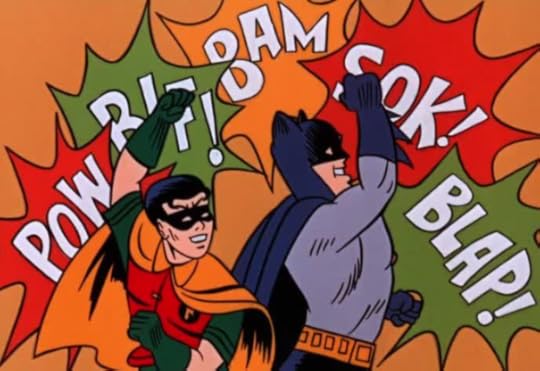
 It could be said that inside every fantasy, there's a reality waiting to burst out. No matter what we might be watching, comedy or drama, we can't help but ask ourselves what might happen "if this were real life." I've certainly done it many times; you remember that article
I wrote a few years ago
when I talked to an expert on theology about how Hogan's Heroes meshed with the Catholic Just War doctrine. Some people thought I was overthinking the whole thing. I don't think so; it was just the reality of war and morality bursting out from a sitcom. Even light entertainment can make you think, and that's not a bad idea. Even superhero movies seem to recognize the need to introduce reality into their stories, even if it's a reality not all of us might recognize.
It could be said that inside every fantasy, there's a reality waiting to burst out. No matter what we might be watching, comedy or drama, we can't help but ask ourselves what might happen "if this were real life." I've certainly done it many times; you remember that article
I wrote a few years ago
when I talked to an expert on theology about how Hogan's Heroes meshed with the Catholic Just War doctrine. Some people thought I was overthinking the whole thing. I don't think so; it was just the reality of war and morality bursting out from a sitcom. Even light entertainment can make you think, and that's not a bad idea. Even superhero movies seem to recognize the need to introduce reality into their stories, even if it's a reality not all of us might recognize.Anyway, there are two genres I've spent a lot of time watching over the last couple of years: the detective shows of Warner Bros., and the samurai and noir movies of Akira Kurosawa. An interesting pairing, I know, and you wouldn't necessarily think the two genres would have much in common. Well, they do and they don't: both the WB shows of the late '50s and early '60s and the Kurosawa movies of the post-war period can be extremely violent. But the way they address violence—well, there's the difference. It's not uncommon for one of the WB detectives—Efrem Zimbalist Jr., say, or Robert Conrad—to trade punches with the criminal and have a chair or two, or perhaps even a bottle, broken over his head, and emerge with nothing more than some blood out of the corner of his mouth. Worst case, he's knocked out for a few minutes—but only if the plot requires that the bad guy escape (temporarily, of course) from the clutches of our hero. (Not just WB, of course; as you can see from the illustration above, plenty of shows shared the same traits.)
Kurosawa and his peers, on the other hand, aren't afraid to let the blood flow, and that's putting it mildly. Last week we watched one of Kurosawa's great samurai movies, the 1961 samurai classic Yojimbo, and you not only had people being killed, they were having limbs chopped off and getting gutted by samurai swords left and right. It wasn't perhaps as graphic as Quentin Tarentino (certainly the language wasn't), but you get the point.
Now, obviously part of the reason for this is the basic difference between television and the movies, especially back then; there were (are are) some things you just don't show on TV. But as I watched Yojimbo, and afterward, I wondered if Kurosawa didn't perhaps have a more enlightened attitude toward graphic violence—and if there wasn't something we might have learned from it. Back in the 1960s, Mickey Spillane—creator of the hard-boiled Mike Hammer novels, and an expert on violence if ever there was one—wrote that television violence should be "improved," not reduced. "Rather than a frenzied, overt violence continually erupting in fist fights and shootouts, the violence is held in check, a grenade with the pin out but the handle still held down." He cited two of television’s greatest authority figures of the time, Joe Friday and Matt Dillon, who rarely resorted to "the stilted, pseudo-bloody action seen in one of some current shows." The violence was there; "It was about to happen every second and you knew it and wondered how it was going to come about. But in between a story got told and an audience got entertained believably, no critics screamed and if kids wanted to emulate a hero they got good ones in Friday and Dillon. And brother, you still don’t mess around with Old Matt."And this is true; the tension of impending violence was so thick in Yojimbo that you could cut it with, well, a samurai sword.
By contrast, Spillane felt that much of the violence then seen on television—the kind featured in the WB detective shows as well as others—was cliché-driven: "fake judo chops or wild punches that can belt a villain 10 feet without knocking his hat off," or "a hero with a chopper dropping a half dozen actors with blank bullets."
There are a couple of points in play here. Spillane is absolutely correct that the threat of violence makes for better stories; he's also right, however, that there's something cheap about the "fake judo chops" and "wild punches" that punctuate action shows on television. They're not realistic; if you have a chair broken over your head, you are not going to just shrug it off, trust me. And having a few punches land on the jaw are going to leave marks on your pretty face, no matter how big a star you might be.
And this brings me back to the point I rased at the beginning. The detective stories we know and love are a fantasy, albeit an entertaining one, and there's a truth waiting to burst out. That truth is that violence is not something to be taken lightly—it hurts. Things have changed mightily since Spillane wrote this article in 1961; for one, the world is a more violent place. As such, the entertainment world can't ignore it. I do think that television has done a better job of integrating it into a more sophisticated means of storytelling, as Spillane predicted it would.
But when we look at all the anti-violence campaigns that television has faced in the past, I think it's a fair question to wonder what good any of them have done? On the other hand, what if Spillane's suggestion had been taken back in 1961? Furthermore, what if the depiction of violence had been more realistic? What if we had restricted the anvil-on-the-head violence to cartoons, but allowed the consequences of it to be shown on live-action programs? To the extent that television violence influenced the behavior of the average viewer, would he or she have been more likely to resort to it if they had seen the blood flow from a punch, had been aware of the concussions from being hit over the head by a chair, had known how fragile the human body actually is? One of the clichés we often hear is how the French don't have the same problem with alcohol that we do here because they have a more sophisticated take on it; they've grown up with it, and they've learned from an early age how to handle it. And if it's true about wine, might it also have been true about violence?
We're beyond all that by now, I think. It might have worked back then because we still had a common culture, religion was still a major part of lives, and things in general were more gentle. But that ship has sailed, and I don't think it's ever coming back. Today, people—young people in general—have grown desensitized to violence; many of them don't even recognize basic humanity, don't place value on a human life any more than they do a pair of shoes. I blame video games for much of this, but television has its part to play, as do all of us. There's no common moral code, no agreement on what's right and wrong; it's all relative. Even mass shootings don't have the effect on us that they once did, and the debates about them generally ignore the most important, most salient points. Put bluntly, as a culture we've lost the ability to be shocked.
As for violence on television today: well, I don't know if people are even surprised by it anymore. Shows like Breaking Bad, The Sopranos and Better Caul Saul made generous use of violence, and they were among the most acclaimed dramas on television. I think that many times, the violence in these shows is psychological as much as it is physical; the sense of "impending violence" that Spillane urged. Meanwhile, as Spillane said of the "good old days," there's nothing new being created in these shows—they're merely reflecting life as it is. That, perhaps, is what should shock us most of all. TV
Published on April 05, 2023 05:00
April 3, 2023
What's on TV? Monday, April 5, 1965

 Well, here we are at the big night, the Academy Awards. We're looking again at the Northern California edition, so we're seeing the Oscars in a different light than usual: the start time, for instance, is 7:00 p.m. Pacific, which would be 10:00 p.m. Eastern. That means it's not the last program in prime time, but the first; the Oscars are followed by the shows that the rest of the country normally sees before the awards, and for those stations that do carry Nightlife, they won't be seeing it tonight, even though everything would be done by then. And did you notice how long the timeslot is? Two hours and 30 minutes; more than enough time, in my opinion. One thing I didn't mention on Saturday is that, on a night devoted to celebrating movies, it's appropriate that we have two all-time greats on after the Oscars: All About Eve at 11:45 p.m on KGO, and Double Indemnity at 11:15 p.m. on KXTV. Being able to watch a classic movie after the Academy Awards: now that is something to celebrate.
Well, here we are at the big night, the Academy Awards. We're looking again at the Northern California edition, so we're seeing the Oscars in a different light than usual: the start time, for instance, is 7:00 p.m. Pacific, which would be 10:00 p.m. Eastern. That means it's not the last program in prime time, but the first; the Oscars are followed by the shows that the rest of the country normally sees before the awards, and for those stations that do carry Nightlife, they won't be seeing it tonight, even though everything would be done by then. And did you notice how long the timeslot is? Two hours and 30 minutes; more than enough time, in my opinion. One thing I didn't mention on Saturday is that, on a night devoted to celebrating movies, it's appropriate that we have two all-time greats on after the Oscars: All About Eve at 11:45 p.m on KGO, and Double Indemnity at 11:15 p.m. on KXTV. Being able to watch a classic movie after the Academy Awards: now that is something to celebrate.-2- KTVU (SAN FRANCISCO-OAKLAND) (IND.) Morning 9:50 RELIGION TODAY—Protestant 10:00 NEWS—Walt Harris 10:30 JACK LA LANNE—Exercise 11:00 ROMPER ROOM—Children Afternoon 12:00 JACK BENNY—Comedy 12:30 TV HOUR OF STARS—Drama 1:30 I WANT TO KNOW—Venter 2:00 MOVIE—Western “The Return of Jack Slade” (1955) 3:25 NEWS 3:30 CAPTAIN SATELLITE—Children 4:30 MICKEY MOUSE CLUB 5:00 LLOYD THAXTON—Music Guest: Johnny Tillotson Evening 6:00 PETER POTAMUS—Cartoons 6:30 YOGI BEAR—Cartoons 7:00 FRACTURED FLICKERS 7:30 MOVIE—Drama “Ruby Gentry” (1952) 9:20 DOCTORS’ NEWS CONFERENCE 10:00 NEWS—Helmso, Jacobs, Mann 10:30 BEST OF GROUCHO—Quiz 11:00 MOVIE—Biography “I’ll See You in My Dreams” (1952) 1:05 STAR PERFORMANCE—Drama
-3- KCRA (SACRAMENTO) (NBC) Morning 6:00 RHYME AND REASON 7:00 TODAY Hugh Downs is on vacation this week 9:00 TRUTH OR CONSEQUENCES—Game COLOR 9:30 WHAT’S THIS SONG COLOR Guests: Lola Albright, Bob Denver 9:55 NEWS 10:00 CONCENTRATION 10:30 JEOPARDY COLOR 11:00 CALL MY BLUFF—Game COLOR Celebrities: Tom Poston, Betty Furness 11:30 I’LL BET—Game COLOR Laraine Day and Michel Grillkhes vs. Bob and Dorothy Jo Barker 11:55 NEWS Afternoon 12:00 NEWS 12:25 NEWS 12:30 LEAVE IT TO BEAVER—Comedy 1:00 DOCTORS—Serial 1:30 ANOTHER WORLD 2:00 YOU DON’T SAY!—Game COLOR Guests: Betty White, Wink Martindale. Host: Tom Kennedy 2:25 NEWS 2:30 MOVIE—Drama “The Petrified Forest” (1936) 4:00 MOVIE—Western “Forty Guns” (1957) 5:45 NEWS Evening 6:00 NEWS—Chet Huntley, David Brinkley 6:30 NEWS 7:00 OUTER LIMITS—Science Fiction 8:00 MAN FROM U.N.C.L.E. 9:00 ANDY WILLIAMS—Variety COLOR Guests: Jonathan Winters, Poliy Bergen 10:00 LET MY PEOPLE GO SPECIAL 11:00 NEWS 11:30 JOHNNY CARSON—Variety COLOR 1:00 NEWS
-4- KRON (SAN FRANCISCO-OAKLAND) (NBC) Morning 5:55 FARM NEWS 6:00 PROFILE—San Diego State 6:30 OUR WORLD—Education 7:00 TODAY Hugh Downs is on vacation this week 9:00 TRUTH OR CONSEQUENCES—Game COLOR 9:30 WHAT’S THIS SONG COLOR Guests: Lola Albright, Bob Denver 9:55 NEWS 10:00 CONCENTRATION 10:30 JEOPARDY COLOR 11:00 CALL MY BLUFF—Game COLOR Celebrities: Tom Poston, Betty Furness 11:30 I’LL BET—Game COLOR Laraine Day and Michel Grillkhes vs. Bob and Dorothy Jo Barker 11:55 NEWS Afternoon 12:00 LET’S MAKE A DEAL—Game COLOR 12:25 NEWS 12:30 MOMENT OF TRUTH—Serial 1:00 DOCTORS—Serial 1:30 ANOTHER WORLD 2:00 YOU DON’T SAY!—Game COLOR Guests: Betty White, Wink Martindale. Host: Tom Kennedy 2:30 MATCH GAME COLOR Guests: Jayne Mansfield, Milt Kamen. Host: Gene Rayburn 2:55 NEWS—Nancy Dickerson 3:00 LARAMIE—Western 4:00 WHIRLYBIRDS—Adventure 4:30 MAYOR ART—Children 5:30 BACHELOR FATHER—Comedy Evening 6:00 NEWS—Chet Huntley, David Brinkley 6:30 NEWS 6:55 SPORTS 7:00 ASSIGNMENT FOUR 7:30 KAREN—Comedy 8:00 MAN FROM U.N.C.L.E. 9:00 ANDY WILLIAMS—Variety COLOR Guests: Jonathan Winters, Poliy Bergen 10:00 ALFRED HITCHCOCK “Power of Attorney” 11:00 NEWS 11:30 JOHNNY CARSON—Variety COLOR 1:00 NEWS 1:30 MOVIE—Comedy “Merrily We Live” (1938)
-5- KPIX (SAN FRANCISCO-OAKLAND) (CBS) Morning 5:55 SUNRISE SEMESTER Russian Literature in Translation 6:25 SOCIOLOGY—Lessons “Higher Education and Poverty” 6:55 KPIX EDITORIAL 7:00 JACK’S PLACE—Children 8:00 CAPTAIN KANGAROO 9:00 NEWS—Mike Wallace 9:30 I LOVE LUCY—Comedy 10:00 ANDY GRIFFITH 10:30 McCOYS—Comedy 11:00 LOVE OF LIFE 11:25 NEWS 11:30 SEARCH FOR TOMORROW—Serial 11:45 GUIDING LIGHT—Serial Afternoon 12:00 NEWS 12:30 AS THE WORLD TURNS—Serial 1:00 PASSWORD—Game Guests: Peter Lind Hayes, Rita Moreno 1:30 HOUSE PARTY Guest: Mrs. Edward G. Robinson 2:00 TO TELL THE TRUTH Panelists: Peggy Cass, Joan Fontaine, Robert Morse, Sam Levenson. Host: Bud Collyer 2:25 NEWS 2:30 EDGE OF NIGHT 3:00 SECRET STORM 3:30 MIKE DOUGLAS—Variety 4:30 MOVIE—Musical “Let’s Rock!” (1958) 5:55 KPIX EDITORIAL Evening 6:00 NEWS 6:30 NEWS—Walter Cronkite 7:00 HAVE GUN—WILL TRAVEL 7:30 TO TELL THE TRUTH 8:00 I’VE GOT A SECRET Guest: Durward Kirby 8:30 ANDY GRIFFITH 9:00 LUCILLE BALL 9:30 MANY HAPPY RETURNS 10:00 CBS REPORTS “Abortion and the Law” 11:00 NEWS 11:20 MOVIE—Science Fiction “Godzilla, King of the Monsters” (Japanese; 1956) 12:50 MOVIE—Drama “Television Spy” (1939)
-6- KVIE (SACRAMENTO) (EDUC.)
Morning 9:10 CLASSROOM—Education Subjects: Mathematics, Spanish, science Afternoon 1:10 CLASSROOM—Education Subjects: Geography, science, music 5:30 BETTY B—Songs 5:45 FRIENDLY GIANT—Children Evening 6:00 WHAT’S NEW—Children 6:30 STOCK MARKET REPORT 6:35 MUSICAL PORTRAITS 7:00 COMMUNISM—Lecture 7:15 GERMANY TODAY 7:30 ENCOUNTERS 8:00 POPULATION PROBLEM SPECIAL 9:00 STORIES OF GUY DE MAUPASSANT—Drama 10:00 PACEM IN TERRIS—Discussion SPECIAL
-7- KGO (SAN FRANCISCO-OAKLAND) (ABC) Morning 6:00 CHANNEL FOR LEARNING 6:30 DIXIE SINGIN’—Music 7:00 MARSHAL ‘J’—Children 8:00 BAT MASTERSON—Western 8:30 COUNT MARCO—Women 9:00 GIRL TALK—Panel Panelists: Claire Berenson, Diahn Williams, Dorothy Strelsin 9:30 MOVIE—Adventure “The Barefoot Mailman” (1951) 11:20 NEWS—Bob Dunn 11:30 PRICE IS RIGHT Celebrity: Sheila MacRae Afternoon 12:00 DONNA REED—Comedy 12:30 FATHER KNOWS BEST 1:00 REBUS—Game 1:30 ON THE SCENE—Dick Stewart 2:00 FLAME IN THE WIND 2:30 DAY IN COURT 2:55 NEWS—Marlene Sanders 3:00 GENERAL HOSPITAL 3:30 YOUNG MARRIEDS 4:00 TRAILMASTER 5:00 MOVIE—Adventure “The Barbarians” (Italian; 1957) Bay Area TV Debut Evening 6:30 LEAVE IT TO BEAVER—Comedy 6:55 SPORTS 7:00 OSCAR AWARDS SPECIAL “Wendy and Me,” “Ben Casey” and “Nightlife” are pre-empted this evening 9:30 BING CROSBY—Comedy 10:00 NO TIME FOR SERGEANTS—Comedy 10:30 VOYAGE—Adventure 11:30 NEWS 11:45 MOVIE—Drama “All About Eve” (1950)
7 KRCR (REDDING) (ABC, NBC) Morning 8:00 TODAY Hugh Downs is on vacation this week Picked up in progress 9:00 TRUTH OR CONSEQUENCES—Game COLOR 9:30 WHAT’S THIS SONG COLOR Guests: Lola Albright, Bob Denver 9:55 NEWS 10:00 CONCENTRATION 10:30 JEOPARDY COLOR 11:00 CALL MY BLUFF—Game COLOR Celebrities: Tom Poston, Betty Furness 11:30 PRICE IS RIGHT Celebrity: Sheila MacRae Afternoon 12:00 DONNA REED—Comedy 12:30 FATHER KNOWS BEST 1:00 REBUS—Game 1:30 ANOTHER WORLD 2:00 FLAME IN THE WIND 2:30 DAY IN COURT 2:55 NEWS—Marlene Sanders 3:00 GENERAL HOSPITAL 3:30 YOUNG MARRIEDS 4:00 TRAILMASTER 5:00 MAGILLA GORILLA—Cartoons 5:30 CASPER—Cartoons Evening 6:00 NEWS 6:30 NEWS—Chet Huntley, David Brinkley 7:00 OSCAR AWARDS SPECIAL “Wendy and Me,” “Ben Casey” and “Nightlife” are pre-empted this evening 9:30 FARMER’S DAUGHTER—Comedy 10:00 NO TIME FOR SERGEANTS—Comedy 10:30 VOYAGE—Adventure 11:30 NEWS 11:45 JOHNNY CARSON COLOR
-8- KSBW (SALINAS) (CBS, NBC) Morning 7:00 TODAY Hugh Downs is on vacation this week 9:00 TRUTH OR CONSEQUENCES—Game COLOR 9:30 WHAT’S THIS SONG COLOR Guests: Lola Albright, Bob Denver 9:55 NEWS 10:00 CONCENTRATION 10:30 JEOPARDY COLOR 11:00 LOVE OF LIFE 11:25 NEWS 11:30 I’LL BET—Game COLOR Laraine Day and Michel Grillkhes vs. Bob and Dorothy Jo Barker 11:55 NEWS Afternoon 12:00 LET’S MAKE A DEAL—Game COLOR 12:25 NEWS 12:30 AS THE WORLD TURNS—Serial 1:00 PASSWORD—Game Guests: Peter Lind Hayes, Rita Moreno 1:30 HOUSE PARTY Guest: Mrs. Edward G. Robinson 2:00 TO TELL THE TRUTH Panelists: Peggy Cass, Joan Fontaine, Robert Morse, Sam Levenson. Host: Bud Collyer 2:25 NEWS 2:30 EDGE OF NIGHT 3:00 SECRET STORM 3:30 MOVIE—Drama “Beware, My Lovely” (1952) 5:30 SUPERMAN—Adventure Evening 6:00 NEWS 6:30 NEWS—Walter Cronkite 7:00 WALT DISNEY’S WORLD 8:00 I’VE GOT A SECRET Guest: Durward Kirby 8:30 ANDY GRIFFITH 9:00 LUCILLE BALL 9:30 MOVIE—Drama “Women’s World” (1954) 11:30 JOHNNY CARSON—Variety COLOR
-9- KQED (SAN FRANCISCO-OAKLAND) (EDUC.) Morning 8:00 CLASSROOM—Education Subjects: Mathematics, science, Spanish Afternoon 1:10 CLASSROOM—Education Subjects: Geography, science, French 4:30 FRENCH CHEF—Cooking Ham Dinner in 30 minutes 5:00 WHAT’S NEW—Children 5:30 TV KINDERGARTEN Evening 6:00 WHAT’S NEW—Children 6:30 PORTRAIT IN MUSIC 7:00 ANTIQUES—George Michael 7:30 ENCOUNTERS 8:00 NATURE OF CONSERVATION 8:30 KALEIDOSCOPE—Discussion 9:00 POPULATION PROBLEM SPECIAL 10:00 RADENZEL REPORTS 10:15 PROFILE: BAY AREA
10 KXTV (SACRAMENTO) (CBS) Morning 6:20 FOCUS ON FARMING 6:30 SUNRISE SEMESTER Russian Literature in Translation 7:00 DIVER DAN—Cartoons 8:00 CAPTAIN KANGAROO 9:00 NEWS—Mike Wallace 9:30 I LOVE LUCY—Comedy 10:00 ANDY GRIFFITH 10:30 McCOYS—Comedy 11:00 LOVE OF LIFE 11:25 NEWS 11:30 SEARCH FOR TOMORROW—Serial 11:45 GUIDING LIGHT—Serial Afternoon 12:00 NEWS 12:30 AS THE WORLD TURNS—Serial 1:00 PASSWORD—Game Guests: Peter Lind Hayes, Rita Moreno 1:30 HOUSE PARTY Guest: Mrs. Edward G. Robinson 2:00 TO TELL THE TRUTH Panelists: Peggy Cass, Joan Fontaine, Robert Morse, Sam Levenson. Host: Bud Collyer 2:25 NEWS 2:30 EDGE OF NIGHT 3:00 SECRET STORM 3:30 DOBIE GILLIS—Comedy 4:00 MIKE DOUGLAS—Variety 5:30 LLOYD THAXTON—Music Guest: Chuck Berry Evening 6:30 NEWS—Walter Cronkite 7:00 NEWS 7:30 TO TELL THE TRUTH 8:00 I’VE GOT A SECRET Guest: Durward Kirby 8:30 ANDY GRIFFITH 9:00 LUCILLE BALL 9:30 MANY HAPPY RETURNS 10:00 CBS REPORTS “Abortion and the Law” 11:00 NEWS 11:15 MOVIE—Drama “Double Indemnity” (1944)
11 KNTV (SAN JOSE) (ABC) Morning 8:00 CONTINENTAL COASSROOM “Foundations of Democracy in America” 8:30 GOSPEL SINGING—Music 9:00 HOCUS POCUS—Children 10:00 GIRL TALK—Panel Panelists: Dody Goodman, Karen Gustafson, Lanie Kazan. Virginia Graham hosts. 10:30 ADVENTURES IN PARADISE 11:30 PRICE IS RIGHT Celebrity: Sheila MacRae Afternoon 12:00 DONNA REED—Comedy 12:30 FATHER KNOWS BEST 1:00 REBUS—Game 1:30 AFTERNOON—Jess and Lu 2:00 FLAME IN THE WIND 2:30 DAY IN COURT 2:55 NEWS—Marlene Sanders 3:00 GENERAL HOSPITAL 3:30 YOUNG MARRIEDS 4:00 TRAILMASTER 5:00 LEAVE IT TO BEAVER—Comedy 5:30 RIFLEMAN—Western Evening 6:00 NEWS 6:30 WORLD OF GIANTS 7:00 OSCAR AWARDS SPECIAL “Wendy and Me,” “Ben Casey” and “Nightlife” are pre-empted this evening 9:30 BING CROSBY—Comedy 10:00 NO TIME FOR SERGEANTS—Comedy 10:30 RICHARD DIAMOND—Mystery 11:00 NEWS 11:30 MOVIE—Historical Drama “Land of the Pharaohs” (1955)
12 KHSL (CHICO) (CBS) Morning 7:30 BIG PICTURE—Army 8:00 CAPTAIN KANGAROO 9:00 NEWS—Mike Wallace 9:30 I LOVE LUCY—Comedy 10:00 ANDY GRIFFITH 10:30 McCOYS—Comedy 11:00 LOVE OF LIFE 11:25 NEWS 11:30 SEARCH FOR TOMORROW—Serial 11:45 GUIDING LIGHT—Serial Afternoon 12:00 OUR MISS BROOKS—Comedy 12:30 AS THE WORLD TURNS—Serial 1:00 PASSWORD—Game Guests: Peter Lind Hayes, Rita Moreno 1:30 HOUSE PARTY Guest: Mrs. Edward G. Robinson 2:00 TO TELL THE TRUTH Panelists: Peggy Cass, Joan Fontaine, Robert Morse, Sam Levenson. Host: Bud Collyer 2:25 NEWS 2:30 EDGE OF NIGHT 3:00 SECRET STORM 3:30 JACK BENNY—Comedy 4:00 MOVIE—Drama “Mr. Skeffington” (1944) 5:30 HAVE GUN—WILL TRAVEL Evening 6:00 NEWS 6:30 NEWS—Walter Cronkite 7:00 MEN IN CRISIS—Documentary 7:30 TO TELL THE TRUTH 8:00 I’VE GOT A SECRET Guest: Durward Kirby 8:30 ANDY GRIFFITH 9:00 LUCILLE BALL 9:30 MANY HAPPY RETURNS 10:00 CBS REPORTS “Abortion and the Law” 11:00 NEWS 11:25 MOVIE—Adventure “Crosswinds” (1951)
13 KOVR (SAC) (ABC) Morning 6:50 NEWS 6:55 RANCH AND GARDEN WORLD 7:00 CARTOONLAND—Children 7:45 MICKEY MOUSE CLUB 8:15 KING AND ODIE—Cartoons 8:30 MOVIE—Comedy “It Should Happen to You” (1953) 10:00 FATHER KNOWS BEST—Comedy 10:30 DONNA REED—Comedy 11:00 REBUS—GAME DEBUT 11:30 PRICE IS RIGHT Celebrity: Sheila MacRae Afternoon 12:00 NEWS 12:15 HELEN BALE—Interviews 12:30 MOVIE—Musical “When You’re Smiling” (1950) 2:00 FLAME IN THE WIND 2:30 DAY IN COURT 2:55 NEWS—Marlene Sanders 3:00 GENERAL HOSPITAL 3:30 YOUNG MARRIEDS 4:00 TRAILMASTER 5:00 CAPTAIN DELTA—Children 5:30 HUCKLEBERRY HOUND Evening 6:00 NEWS 6:15 NEWS—Peter Jennings 6:30 WELLS FARGO—Western 7:00 OSCAR AWARDS SPECIAL “Wendy and Me,” “Ben Casey” and “Nightlife” are pre-empted this evening 9:30 BING CROSBY—Comedy 10:00 NO TIME FOR SERGEANTS—Comedy 10:30 HAVE GUN—WILL TRAVEL 11:00 NEWS 11:30 BRONCO—Western 12:30 TIGHTROPE!—Police 1:00 NEWS
TV
Published on April 03, 2023 05:00
April 1, 2023
This week in TV Guide: April 3, 1965
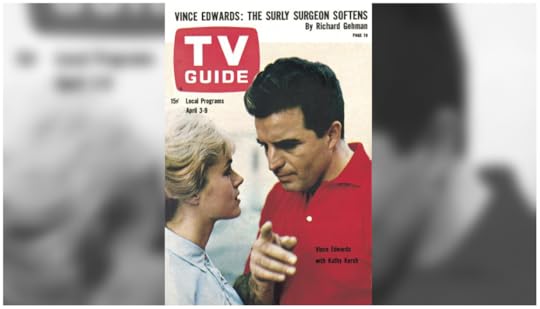
 XxLet's start this week with Vince Edwards. The star of ABC's medical drama Ben Casey has long had a reputation, and as you know, when we speak of having a "reputation," it's usually a bad one. As Richard Gehman describes him, "Edwards was stubborn and surly, uncooperative, unavailable and—it was our suspicion—uncouth." His brooding, scowling visage on television caused Hollywood types to regard him "with all the joy we would have shown if we had scared out a Gila monster." Now, as you know if you've been reading me for a few years, I'm always a little skeptical of Gehman's pop psychology/snark analysis of celebrities, but in this case his observations aren't without merit; there are many stories of how Sam Jaffe, who played Casey's mentor, Dr. David Zorba, quit before Casey's final season because he'd become fed up with Edwards' unprofessionalism and his addiction to spending time at the racetrack betting on the horses instead of doing his scenes.
XxLet's start this week with Vince Edwards. The star of ABC's medical drama Ben Casey has long had a reputation, and as you know, when we speak of having a "reputation," it's usually a bad one. As Richard Gehman describes him, "Edwards was stubborn and surly, uncooperative, unavailable and—it was our suspicion—uncouth." His brooding, scowling visage on television caused Hollywood types to regard him "with all the joy we would have shown if we had scared out a Gila monster." Now, as you know if you've been reading me for a few years, I'm always a little skeptical of Gehman's pop psychology/snark analysis of celebrities, but in this case his observations aren't without merit; there are many stories of how Sam Jaffe, who played Casey's mentor, Dr. David Zorba, quit before Casey's final season because he'd become fed up with Edwards' unprofessionalism and his addiction to spending time at the racetrack betting on the horses instead of doing his scenes. But we're straying from the story, which is colorful enough. A couple of years ago Gehman was writing an article on the show for TV Guide, and Edwards stood him up four times; he finally wrote the story without Edwards. Recently, though, the two of them were seated opposite each other at a birthday party for Walter Winchell (!), and became acquainted enough that Edwards agreed to an interview, at which he opens up on subjects he hasn't previously talked about. He's in psychoanalysis, for example, "because I wasn't utilizing the full capacity of my own ability because of certain guilts and hang-ups." In other words, he ought to stop not liking himself and give himself credit for having succeeded as he has.
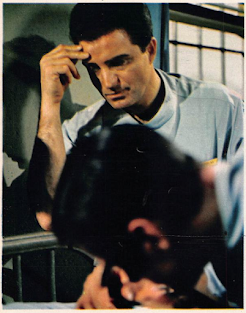 He says directing has allowed him to understand the importance of maintaining the show's budget, that "to make money, art sometimes goes out the window." "There's a place to sell filet mignon and a place to sell hot dogs," he says. "Television is hot dogs." He's not bored with Ben Casey, but he is tired; his five-year contract ends next year, and that's when the series will end. He wants to produce and direct more, record more, make some more movies, have a family. He sounds like a man struggling to find his place in his life; "I sit here many a night, thinking, 'Well, where am I going, what am I going to do, and what are they going to write about me when I go?'"
He says directing has allowed him to understand the importance of maintaining the show's budget, that "to make money, art sometimes goes out the window." "There's a place to sell filet mignon and a place to sell hot dogs," he says. "Television is hot dogs." He's not bored with Ben Casey, but he is tired; his five-year contract ends next year, and that's when the series will end. He wants to produce and direct more, record more, make some more movies, have a family. He sounds like a man struggling to find his place in his life; "I sit here many a night, thinking, 'Well, where am I going, what am I going to do, and what are they going to write about me when I go?'"He also says he has no problem being "part of the machinery," because it's his job, and because he wants to work. At the end of the day, "when they finally shut my orbs I can breathe a sigh of relief and pass on without having any guilts, and having enjoyed what Ive earned. That’s all I can say." It seems to be enough for Gehman; "The surly, stubborn, uncooperative, unavailable and uncouth Vince Edwards who started out playing Ben Casey is a good deal different today." Perhaps it was the analysis that did it, but "analysis is only a tool for a man who [already] wants to improve himself." For whatever reason, "Vince Edwards is a changed man. For the better."
l l l
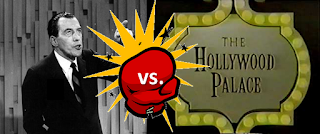 During the 60s, the Ed Sullivan Show and The Hollywood Palace were the premiere variety shows on television. Whenever they appear in TV Guide together, we'll match them up and see who has the best lineup.
During the 60s, the Ed Sullivan Show and The Hollywood Palace were the premiere variety shows on television. Whenever they appear in TV Guide together, we'll match them up and see who has the best lineup.Sullivan: Ed’s guests are Vince "Ben Casey" Edwards, comedian Alan King, singer Abbe Lane, comedian George Kirby, English pop singer Cilla Black, French singer Jean Paul Vignon, English music-hall comic Arthur Haynes and Djoliba, an African instrumental and dance ensemble.
Palace: Host Dale Robertson introduces guitar-strumming George Gobel, who does a comedy monolog; singer-dancer Lisa Kirk; songstress Barbara McNair; comic Tim Conway of McHale’s Navy in an obstetrician sketch; the comedy team of Gaylord and Holiday; the Four Winds of Notre Dame, vocal quartet; the Morways from Prague, teeterboard artists; and the Hanneford Family's comedy animal act.
The question is: how funny is Tim Conway in a obstetrician sketch? (We already know what he's like in a dentist sketch .) And is he funny enough to elevate this week's Hollywood Palace? We don't know the answer for sure, but my money's on Ed; even though Vince Edwards (whom we'll read more about later) is appearing ascv a singer, I'm casting my lot with Alan King and company. It's not the greatest lineup we've ever seen, but it's good enough to give Ed the edge.
l l l
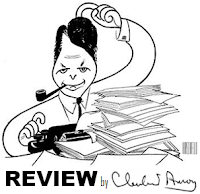 Throughout the 60s and early 70s, TV Guide's weekly reviews were written by the witty and acerbic Cleveland Amory. Whenever we get the chance, we'll look at Cleve's latest take on the shows of the era.
Throughout the 60s and early 70s, TV Guide's weekly reviews were written by the witty and acerbic Cleveland Amory. Whenever we get the chance, we'll look at Cleve's latest take on the shows of the era. I did not know this, but according to Cleveland Amory, The King Family was ABC's replacement for The Outer Limits. Of course the possibilities are limitless, and so is the King Family: at 36 members (currently), that, says Cleve, amounts to two Kings per square inch on his screen. "It has been said that one can take, in murder mysteries, one murder, two, even three or four murders. But at five one becomes uneasy and at six one draws the line. One now has not just a murder but a massacre." That's not to accuse the King Family of such horrors, but it does seem at times as if even the members of the family have trouble keeping track of their numbers.
Despite all this, there's a lot to like about The King Family. The production is smooth and quick-paced, thanks to producers Nick Vanoff (who also does The Hollywood Palace*) and Saul Ilson (a veteran of The Smothers Brothers and The Danny Kaye Show), and to the children, who are "extraordinary": "They are, among other things, the least pushed-to-perfection stage children we have seen—perhaps because their mothers aren’t “stage” mothers who stay backstage, but mothers on the stage."
*The King Family Show was the result of their successful appearance on The Hollywood Palace, which generated a reported 53,000 letters of approval, back when people wrote letters.
Cleve is mightily impressed with the King women as well, particularly the original King Sisters (Yvonne, Alyce, Luise and Marilyn). Undoubtedly, although he didn't single her out, he's also impresed with Yvonne's daughter, Tina Cole, who would graduate to My Three Sons. He's not, however, that impressed with the males of the family, save Alvino Rey, Luise's husband and conductor of the show's orchestra, "who can play any instrument, even the ones he makes himself," The King Family lasts for two seasons, plus a revival in 1969; they also appeared in syndicated holiday specials for ten years. It's a very pleasant setup for a Christmas special, but as a regular series, The King Family is from another era.
l l l
There have been big changes in the broadcasting industry recently, with three of the more prominent figures being given the pink slip. Since TV Guide devotes one entire page of its "As We See It" editorial to the changes, we probably ought to take a look at them, and the lesson to be learned. For each of them, in his own way, was a con man, which isn't necessarily a bad thing; the key to success in this industry is being "a rich blend of businessman, salesman, showman and con man." You either have it or you don't; it's just that sometimes, you have it and then you lose it.
First is James Aubrey, until recently the president of CBS. "His con was playing the ruthless heavy. He alienated some of CBS's top stars by kicking them around. He alienated his executive colleagues by making all decisions himself. He alienated advertisers by telling them what they could buy. He alienated the press by refusing to talk to reporters. He alienated everyone but his buddy Keefe Brasselle, an unsuccessful ham whom Aubrey turned into a production tycoon overnight with three shows —all awful—on the CBS network in prime time." He finally realized that the people you kick on the way up are waiting for you.
Matthew J. Culligan was a success as head of NBC Radio, and used to be head of the Curtis Publishing Company. "His con was action. He was busy, busy, busy. It worked at NBC. It got him his job at Curtis. He couldn't wait for autos—he traveled by helicopter and zipped from redecorating fancy new offices, to explaining to advertisers how he was going to take Curtis out of the red, to reorganizing magazines by placing men in command whose chief aim was to get rid of Culligan." It sounds like a great idea for a TV series, doesn't it?
Finally, and sadly, there's Pat Weaver. "His con was dreaming. As president of NBC he dreamed beautifully, envisioning—and bringing to reality—the Today show and The Tonight Show and the concept of special shows pre-empting regular programming. But Weaver dreamed expensively and he had to take his dreams to an advertising agency. Then the promoters of Subscription TV came along and Weaver was hired to dream of a brave new television world where viewers would pay and pay and pay. The viewers didn’t pay." Or perhaps, as was so often the case, he was just ahead of his time—or ahead of the viewers.
The lesson, and I think this is one we should all take to heart: "Maybe a con isn’t supposed to work forever."
l l l
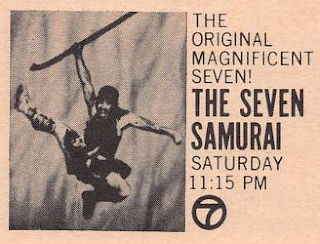 What do we have to look forward to on the tube? Well, if you're a kid like I was, you'll be excited to see the return of Top Cat (Saturday, 8:00 a.m. PT, NBC). The cartoon originally aired in prime time on ABC during the 1961-62 season, but I think it's best known for its long run on Saturday mornings. I've got the box set, so Saturday morning is whenever I want it to be. It's also the debut of Secret Agent (9:00 p.m., CBS), the Patrick McGoohan-helmed follow-up to Danger Man and the precursor to The Prisoner, which I mentioned last week. And if you can stay up late, you won't want to miss The Seven Samurai (11:15 p.m., KGO), Akira Kurosawa's magnificent samurai movie, which was the inspiration for The Magnificent Seven.
What do we have to look forward to on the tube? Well, if you're a kid like I was, you'll be excited to see the return of Top Cat (Saturday, 8:00 a.m. PT, NBC). The cartoon originally aired in prime time on ABC during the 1961-62 season, but I think it's best known for its long run on Saturday mornings. I've got the box set, so Saturday morning is whenever I want it to be. It's also the debut of Secret Agent (9:00 p.m., CBS), the Patrick McGoohan-helmed follow-up to Danger Man and the precursor to The Prisoner, which I mentioned last week. And if you can stay up late, you won't want to miss The Seven Samurai (11:15 p.m., KGO), Akira Kurosawa's magnificent samurai movie, which was the inspiration for The Magnificent Seven. Classical music fans will want to tune in for Camera Three (Sunday, 9:00 a.m., CBS), featuring Peter Schickele—who has an entire comic persona as P.D.Q. Bach, "the hitherto unknown son of Bach,"—discussing, appropriately enough, humor and parody in music. Schickele, who spent five decades doing his Bach schtick*, is one of those rare humorists who can, in his own persona, can discuss his topic with intelligene and insight. We had the good fortune to attend one of his P.D.Q. concerts a few years ago; it was a delightful, hilarous evening. Turning to nighttime, ABC presents a David L. Wolper documentary, The General (7:30 p.m.), profiling the late Gen. Douglas MacArthur on the first anniversary of his death. It's sponsored by 3M, as part of their continuing series of specials on important issues of the day.
*One of his favorite bits was a conposition called "Concerto for Piano vs. Orchestra," which, in concert, would often feature a local sports announcer "calling the action" between the pianist and the orchestra.
Monday's highlight is the 37th annual Academy Awards, live from Santa Monica and hosted by Bob Hope (7:00 p.m., ABC). It's another great year for the motion picture industry, with five Oscar-nominated films that everyone is familiar with and many people have seen—in other words, the exact opposite of what the Oscars are like today: Becket, Dr. Strangelove, Mary Poppins, Zorba the Greek, and the big winner of the evening, My Fair Lady. Andy Williams performs one of the year's nominated songs, "Dear Heart," from the movie of the same name; thanks to the miracle of video tape, he also appears on his own show (9:00 p.m., NBC), where his guests are Jonathan Winters and Polly Bergen. And for futurists everywhere, there's the 1939 movie Television Spy (12:50 a.m., KPIX), with William Henry as a young radio engineer trying to solve the problem of sending television signals over long distances. Forget it, kid; it'll never fly.
NBC's Hullabaloo, along with ABC's Shindig, was one of the 1960s variety shows featuring pop music stars (along with the Hullabaloo Dancers). Some of them might seem as if they're more in tune with the 1950s, while other acts are precisely what we think of when we consider the Beatles era. This week (Tuesday, 8:30 p.m.) we've got a mix of both: Paul Anka hosts, and sings "Red Roses for a Blue Lady"), with Chubby Checker, Sylvie Vartan, Joe and Eddie, Del Shannon, the Greenwood County Singers, and David Clayton Thomas and the Shays. During the early episodes of Hullabaloo, Beatles manger Brian Epstein would host a segment from London; this week, he introduces Mariane Faithfull.
 Wednesday features the season's final presentation of the Hallmark Hall of Fame, with Julie Harris starring as Florence Nightingale in "The Holy Terror" (7:30 p.m, NBC) with an outstanding supporting cast that includes Denholm Elliott, Kate Reid, Torin Thatcher, and Brian Bedford. Appropriately enough, Julie Harris is also profiled in this week's issue, with Robert Higgins writing that for all the success she's achieved on Broadway, in Hollywood, and on television, the actress remains a private, enigmatic person off-stage. "I’ve failed so many times as an actress," she tells Higgins. "I’m not an artist by any means. I don’t think I'll ever be one." Even today, considered one of America's finest actresses, she struggles with her own identity; powerfully shaped by an unhappy childhood which she overcame only by burying herself in her roles, she's only now starting to realize that there's more to life than work. And yet: "My family is as important to me as my life, but that doesn’t tell me who I am. Some people never do find themselves. But I, for one, have to go on trying." By the time of her death at age 87 in 2013, she had five Tony Awards, three Emmys, a Grammy, and an Oscar nomination to show for a brilliant career. And I'm not going to make any smart cracks about this being another example of how Hall of Fame used to turn out high-quality drama, although you can see for yourself in
this clip
.
Wednesday features the season's final presentation of the Hallmark Hall of Fame, with Julie Harris starring as Florence Nightingale in "The Holy Terror" (7:30 p.m, NBC) with an outstanding supporting cast that includes Denholm Elliott, Kate Reid, Torin Thatcher, and Brian Bedford. Appropriately enough, Julie Harris is also profiled in this week's issue, with Robert Higgins writing that for all the success she's achieved on Broadway, in Hollywood, and on television, the actress remains a private, enigmatic person off-stage. "I’ve failed so many times as an actress," she tells Higgins. "I’m not an artist by any means. I don’t think I'll ever be one." Even today, considered one of America's finest actresses, she struggles with her own identity; powerfully shaped by an unhappy childhood which she overcame only by burying herself in her roles, she's only now starting to realize that there's more to life than work. And yet: "My family is as important to me as my life, but that doesn’t tell me who I am. Some people never do find themselves. But I, for one, have to go on trying." By the time of her death at age 87 in 2013, she had five Tony Awards, three Emmys, a Grammy, and an Oscar nomination to show for a brilliant career. And I'm not going to make any smart cracks about this being another example of how Hall of Fame used to turn out high-quality drama, although you can see for yourself in
this clip
.Perry Como's live Kraft Music Hall tour of America continues on Thursday from the Miami Beach Auditorium (10:00 p.m. tape delay to the West Coast, NBC); Mr. C's guests are Al Hirt, Woody Allen, and Connie Stevens. I think the idea of these live broadcasts from around the country is terrific; there's very little live television being done these days, and the road show concept gives it the feel of a real special; too bad nobody can do this today.
On Friday, Jack Carter wraps up his two-week run as guest host on Nightlife, ABC's alternative to Johnny Carson. (11:15 p.m.) This is during the strange interlude between Les Crane hosting stints; it was The Les Crane Show from August of 1964 to February 1965, at which time Crane was sacked and the show renamed Nightlife. It then continued with guest hosts until late June, when Crane returned as host; he'd stay with the show until the end of original episodes on October 29, 1965. And what did the viewers think of it? Well, our Letters section may give us a clue: Ken Chu, of New York City, writes, "The United States had it first, Russia second, and now ABC has the biggest bomb of all—ABC's Nightlife." Lest we think this is a one-off, Eve Kennedy of Milwaukee asks a simple question: "Where is the life in ABC's Nightlife." After that, I guess we need not ask any further.
l l l
A quick note on a controversial topic that could stand a much longer writeup: religion on television, and we're not talking about the televangelist kind.
Holy Week begins on Sunday, April 11, and so TV Guide takes the opportunity to examine the state of religious programming. "Ecumenism," or religious tolerance (not meant to be a definitive definition, to be sure), is all the rage right now, coming on the heels of the Second Vatican Council, and the most honored of faith-based programs—Directions ’65 on ABC; Lamp unto My Feet and Look Up and Live on CBS; and Frontiers of Faith, The Eternal Light and The Catholic Hour on NBC—are often answering the challenge "by dramatizing through the arts the need for unity in a rapidly fragmenting world." Such programs, Neil Hickey notes, couch their message "in the language of dance, poetry, song and drama, and thus are not overtly 'religious' in a doctrinal sense."
 Not everyone agrees with the worthiness of these programs, though. Fr. Norman J. O'Connor, director of the Catholic Paulist Communications, says "Religious programs on network television are generally punk. That’s spelled p-u-n-k." His complaints are that such arty endeavors "miss their audience entirely," that for people in search of religious programming, "[t]heir interests are not represented. Therefore, they have a severe dissatisfaction with the material." He goes on to point out that those producing such programs have little to no experience in the entertainment business, with the result that "the shows have hardly any entertainment value—no color, feeling, or mood. They look as though they’re cultural, but they’re not, really. A little 'show biz' wouldn’t hurt them." His criticisms are shared by many Protestant observers, who concede that the networks have little interest in this type of programming. "If the networks could dispense with religious shows, and replace them with movies or reruns of situation comedies—the sort of thing that could turn a dollar—they’d do so,” says one Protestant broadcaster."
Not everyone agrees with the worthiness of these programs, though. Fr. Norman J. O'Connor, director of the Catholic Paulist Communications, says "Religious programs on network television are generally punk. That’s spelled p-u-n-k." His complaints are that such arty endeavors "miss their audience entirely," that for people in search of religious programming, "[t]heir interests are not represented. Therefore, they have a severe dissatisfaction with the material." He goes on to point out that those producing such programs have little to no experience in the entertainment business, with the result that "the shows have hardly any entertainment value—no color, feeling, or mood. They look as though they’re cultural, but they’re not, really. A little 'show biz' wouldn’t hurt them." His criticisms are shared by many Protestant observers, who concede that the networks have little interest in this type of programming. "If the networks could dispense with religious shows, and replace them with movies or reruns of situation comedies—the sort of thing that could turn a dollar—they’d do so,” says one Protestant broadcaster."The reason they don't is because they're obliged to provide affiliates with religious programs so those affiliates can comply with FCC regulations. But, in the wake of the Supreme Court decision banning school prayer, there are now those who claim that the FCC "is in violation of the First Amendment when it employs the power of the Government to force TV stations to promote religion." If the FCC requirement is abolished, would networks still produce such programming? (Hint: no.) It's unfortunate, because regardless of your religion, or lack thereof, these programs are some of "the last expressions of individualistic thinking on television—artistically, culturally, sociologically." They've also been a "training ground" for young actors and writers; some of those young actors who grew up in the "pulpit playhouse" include Steve McQueen, James Dean, Warren Beatty, George Peppard, Suzanne Pleshette, Sal Mineo, and Colleen Dewhurst. They were some of the last forms of dramatic anthology and cultural programming—and for all the religious networks that exist today, the absence of this kind of programming on network television is missed.
l l l
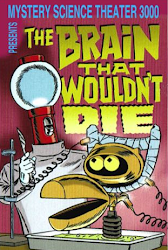 MST3K alert: The Brain That Wouldn't Die. (1960) "A scientist tries to bring his girl friend back to life. Jason Evers, Virginia Leith." (Friday, 11:15 p.m., KSBW) That cartoon pretty much sums up this story of a mad doctor (are you surprised it's Jason Evers?) who keeps his fiancée's severed head alive while he tries to find a suitable body to graft the head onto. But then, what would Friday night be without a good mad doctor flick? Notably, this is also the first episode featuring Michael J. Nelson as the replacement for Joel Hodgson. The rest is history. TV
MST3K alert: The Brain That Wouldn't Die. (1960) "A scientist tries to bring his girl friend back to life. Jason Evers, Virginia Leith." (Friday, 11:15 p.m., KSBW) That cartoon pretty much sums up this story of a mad doctor (are you surprised it's Jason Evers?) who keeps his fiancée's severed head alive while he tries to find a suitable body to graft the head onto. But then, what would Friday night be without a good mad doctor flick? Notably, this is also the first episode featuring Michael J. Nelson as the replacement for Joel Hodgson. The rest is history. TV
Published on April 01, 2023 05:00
March 31, 2023
Around the dial
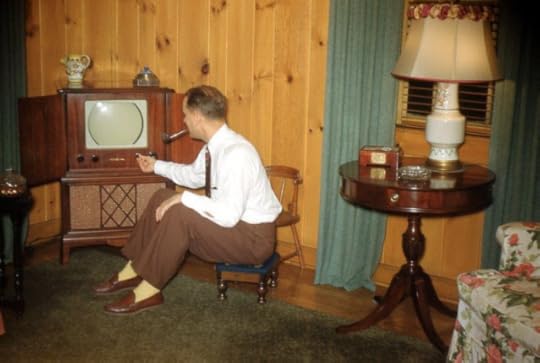
 It's 1964, the start of the third season of The Saint, and at Silver Scenes, it's a look at that episode, "
The Miracle Tea Party
," a delightful episode that serves as an entry in that "
Favorite TV Show Episode
" blogathon I was talking about on Wednesday. Be sure to check them out; maybe I'll have another chance next year!
It's 1964, the start of the third season of The Saint, and at Silver Scenes, it's a look at that episode, "
The Miracle Tea Party
," a delightful episode that serves as an entry in that "
Favorite TV Show Episode
" blogathon I was talking about on Wednesday. Be sure to check them out; maybe I'll have another chance next year!Here's another entry from that blogathon—at Once Upon a Screen, Aurora takes us back to a Columbo episode that, I think, ranks near the top in everyone's list of favorites: " Any Old Port in a Storm ," with a terrific performance by the always-outstanding Donald Pleasence as the murderous winery owner, and Gary Conway as his deceased brother. I always enjoy this one.
And since Terence at A Shroud of Thoughts is hosting the blogathon, I'd be remiss if I didn't highlight his contribution as well. It's " Home ," a 1996 episode of The X-Files, that is truly disturbing, not least because the story occurs not in the big city, but in a small town (the sheriff is even named Andy Taylor, though not that one), and it brings the horror—home.
John's latest entry in his 1980s TV series retrospective at Cult TV Blog is the excellent series Mapp and Lucia, based on the equally respected novels by E.F. Benson. and the episode " Lobster Pots ." There have been two versions of the series, so if you want see what John's raving about, be sure to look for the 1985 version.
At Comfort TV, David brings his trip through 1971 television to a close with a look at Saturday night , and again I have to stress how Saturday used to be a killer night for television: All in the Family, Funny Face, The New Dick Van Dyke Show, Mary Tyler Moore, and Mission: Impossible were CBS's dominant lineup, but there were some others to check out, including The Persuaders (sorry, David).
We're coming up on Holy Week, which means it's a good time to review a series called Greatest Heroes of the Bible (a series that could never be aired on broadcast television today), and at Drunk TV, Paul looks at volume two of this 1978-79 series, with a collection of episodes dealing with " God's Chosen Ones ." I only hope I'll get to be one.
The Broadcast Archives has a brief pictoral look back at Carol Burnett back in the late 1950s or early 1960s, and aside from the pictures, it's a good reminder that next month she turns 90, and if that makes you feel old, then just go back and watch more of her shows, forget about your problems, and have some fun.
Some more promising news from Television Obscurities, where Robert reports that ClassicFlix, which has brought back several rare series via DVD, has another one in store come June: 21 Beacon Street, a detective drama with Dennis Morgan. I confess that I don't know anything about it other than recognizing the titles from TV Guide, so it could be interesting.
Cult TV Lounge revisits the 1976 limited anthology series Beasts , which draws its credibility from its cxreator, Nigel Kneale, who is responsible for the legendary British sci-fi series of the 1950s, Quatermass. Sounds like it's well worth watching—and by the way, Kneale is responsible also for a British TV movie that you'll be reading about in a future "Descent into Hell" essay.
At Shadow & Substance, Paul visits an unlikely suburb of TZ; " The Hound of Heaven ," a short dramatic sketch written by Earl Hamner Jr. for The Kate Smith Hour in 1953 (I didn't even know that show had dramatic sketches.) and has a cast including John Carradine and a very young James Dean. The story would become the bases for the third season TZ episode "The Hunt." TV
Published on March 31, 2023 05:00
March 29, 2023
What I've been watching: February, 2023
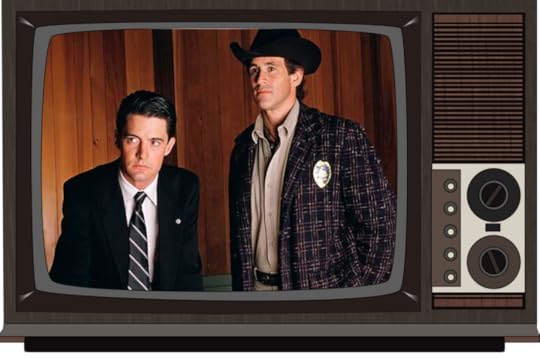
Shows I’ve Watched:Shows I've Added:Twin Peaks (season 1)Harry-O
The Lineup
 There's a blogathon that's run several times in the past: "The Favorite TV Show Episode Blogathon." I've never entered it when it's come around, partly because I couldn't decide if it means my most favorite TV episode ever, or if it's the favorite episode of my favorite TV series. Now, I don't know if Twin Peaks is one of my top 10 series of all time (I'll be revisiting that list next month, so maybe we'll find out then!), but I can say with complete certainty that it contains my favorite episode of any show I've ever watched. Having determined that, we can now be sure that this particular blogathon will never come around again.
There's a blogathon that's run several times in the past: "The Favorite TV Show Episode Blogathon." I've never entered it when it's come around, partly because I couldn't decide if it means my most favorite TV episode ever, or if it's the favorite episode of my favorite TV series. Now, I don't know if Twin Peaks is one of my top 10 series of all time (I'll be revisiting that list next month, so maybe we'll find out then!), but I can say with complete certainty that it contains my favorite episode of any show I've ever watched. Having determined that, we can now be sure that this particular blogathon will never come around again.For anyone under the age of, say, 40, it may be hard to explain just how transformative—how radical, how subversive, how bizarre—the pilot for Twin Peaks was when it premiered on ABC on April 8, 1990. I think it's safe to say that nothing like it had ever been seen on network television before, and rewatching it 33 years later, it still comes across as a remarkable two hours. If anything about it seems clichéd today, it's because of the many attempts to copy it since then; but Twin Peaks was the first, and in most ways, the best.
For one thing, it had the involvement of one of the boldest filmmakers of his time, David Lynch. Lynch had first appeared on the scene with his cult favorite Eraserhead, and followed up with a Best Director nomination for The Elephant Man. (He received a second nomination for Blue Velvet, a movie with a passing resemblance to Twin Peaks; perhaps it happened in another neighborhood. A third followed, for Mulholland Dr., which is strange on a different plane.) Giving Lynch the keys to a weekly television series was a real statement; the fact that I can't really say for sure what kind of statement it was speaks for itself. He teamed up with Mark Frost, a writer who'd worked on episodes of Hill Street Blues; together they came up with a combination police procedural/soap opera/coming of age story, one that took the conventional (police trying to solve a murder) and dropped it in the middle of a fantastical setting, one that would have been perfectly at home in a Fellini movie.
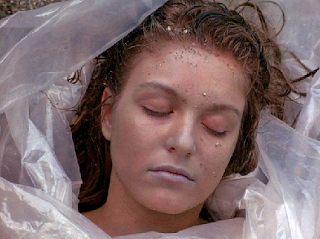 If you're not familiar with Twin Peaks, the basics are this: a teenaged girl's dead body, wrapped in plastic, washes ashore in the town of Twin Peaks, Washington. Because of the similarities to another murder that took place in the Northwest, the FBI, in the form of special agent Dale Cooper (Kyle McLaughlin) is brought into the case, and forms a close working relationship with Sheriff Harry Truman (Michael Ontkean). Laura Palmer, the dead girl, was popular, beautiful, homecoming queen of the high school, and her violent death affects every member of the town; those effects form part of the deepening mystery, which combines elements of the supernatural with prostitution, drug dealing, surrealistic dream worlds, and absurdist comedy. Nothing, as they say in these kinds of stories, is what it seems.
If you're not familiar with Twin Peaks, the basics are this: a teenaged girl's dead body, wrapped in plastic, washes ashore in the town of Twin Peaks, Washington. Because of the similarities to another murder that took place in the Northwest, the FBI, in the form of special agent Dale Cooper (Kyle McLaughlin) is brought into the case, and forms a close working relationship with Sheriff Harry Truman (Michael Ontkean). Laura Palmer, the dead girl, was popular, beautiful, homecoming queen of the high school, and her violent death affects every member of the town; those effects form part of the deepening mystery, which combines elements of the supernatural with prostitution, drug dealing, surrealistic dream worlds, and absurdist comedy. Nothing, as they say in these kinds of stories, is what it seems. And that's Twin Peaks in a nutshell. Lynch shot the pilot with an alternete ending, solving the murder, so that it could be released as a movie if ABC passed on it as a regular series. But the network did pick it up, and so Twin Peaks premiered as a limited series; when it proved to be a ratings blockbuster (one of the most talked-about TV shows of its time), renewed it for a second season, where it turned out not everything was wrapped up as neatly as we thought. Not surprisingly, the second season floundered—ABC, proceeding on the assumption that nothing succeeds like excess, drove it into the ground (as it would Who Wants to Be a Millionaire? a decade later)—and the series was eventually cancelled, only to be resurrected a quarter-century later on Showtime, with Lynch and Frost picking up the story after 25 years had passed.
But this isn't about Twin Peaks Season One, which, for the most part, is superb; nor is it about Season Two, which, for the most part, isn't; or Season Three, which we'll look at after we're done rewatching seasons one and two. This is all about the pilot, and what made—and makes—it so unsettling, so extraordinary.
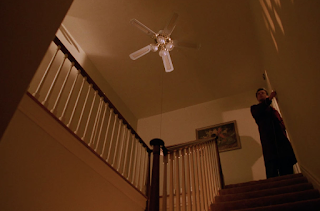 Take, for instance, the scene in Twin Peaks High: the empty desk at roll call, a girl running screaming past the classroom window just before the students are given word of Laura's death, the principal's announcement echoing down the empty corridors of the school. The scene at Laura's house, her mother calling around wondering where she is, the framing of the ceiling fan in the upstairs hallway (surely the most sinister ceiling fan ever seen on television). The scene at the Great Northern Hotel, where Leland Palmer, Laura's father, tries to reassure his frantically worried wife while Sheriff Truman is seen in the background through the window, preparing to give Leland the horrible news. The malfunctioning fluorescent lights in the room where Agent Cooper examines Laura's corpse, a surreal moment made even moreso by the knowledge that the light actually was malfunctioning, and Lynch decided to go with it because of its disorienting effect. The intermittent shots of a lonely stop light, swaying back and forth to the sound of an ominous wind. The brawl at the Roadhouse (actually, the "Bang Bang Bar"), a dive favored by "bikers, loving couples, and lovers of good music," set against the backdrop of hypnotic vocals sung by singer Julee Cruise (and written by Lunch), set to the haunting music of Angelo Badlamenti (perhaps the most unlikely kind of biker bar music you're ever apt to encounter).
Take, for instance, the scene in Twin Peaks High: the empty desk at roll call, a girl running screaming past the classroom window just before the students are given word of Laura's death, the principal's announcement echoing down the empty corridors of the school. The scene at Laura's house, her mother calling around wondering where she is, the framing of the ceiling fan in the upstairs hallway (surely the most sinister ceiling fan ever seen on television). The scene at the Great Northern Hotel, where Leland Palmer, Laura's father, tries to reassure his frantically worried wife while Sheriff Truman is seen in the background through the window, preparing to give Leland the horrible news. The malfunctioning fluorescent lights in the room where Agent Cooper examines Laura's corpse, a surreal moment made even moreso by the knowledge that the light actually was malfunctioning, and Lynch decided to go with it because of its disorienting effect. The intermittent shots of a lonely stop light, swaying back and forth to the sound of an ominous wind. The brawl at the Roadhouse (actually, the "Bang Bang Bar"), a dive favored by "bikers, loving couples, and lovers of good music," set against the backdrop of hypnotic vocals sung by singer Julee Cruise (and written by Lunch), set to the haunting music of Angelo Badlamenti (perhaps the most unlikely kind of biker bar music you're ever apt to encounter).All this is the stuff of genius, a masterpiece of composition, the kind of thing that you might see on the big screen but seldom on television, and the effect it leaves on viewers is indescribable. As Washington Post critic Tom Shales wrote in a preview of the pilot (which is where I might have gotten the urge to watch it when it came on, "Twin Peaks isn’t just a visit to another town; it’s a visit to another planet. Maybe it will go down in history as a brief and brave experiment. But as can be said of few other TV shows in the near or immediate future: This You Gotta See."
Couple this with Frost's elliptical dialogue, brilliant performances by everyone (especially Kyle MacLaughlin) and a cast of memorable characters—townsfolk that play as comic relief, but drawn from theater of the absurd, scenes that leave you laughing out loud one moment and gasping in shock the next—and you have the makings of what The Boston Globe's Diana White called "the movie that will change TV" history. It introduced a flock of quirky, weird shows hoping to capitalize on how weird was now in, but of course imitations are seldom able to live up to the original.
It was, of course, just as impossible for the series to live up to the initial billing of the pilot, and as the second season progressed, things strayed further and further away from Lynch's original concept. Lynch deliberately left plotlines hanging in the final episode, knowing that they weren't going to be resolved—at least not right away. When the series returned on Showtime in 2017, with Lynch's total involvement, the series promised to return to its original weirdness.
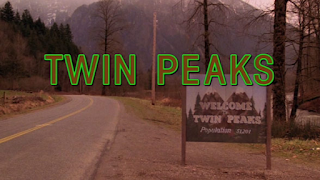 There's no question that the longer Twin Peaks went on, the weaker it became. The first season managed to maintain a high level throughout, but even near the end, it seemed to be losing steam. The second season started off strong, but I remember, during its original run, that I eventually quit watching; when the cancellation was announced, I was glad. It was like seeing a badly injured animal put out of its misery. The soap opera elements, which had been played for satire, started to overwhelm the show. With the Laura Palmer mystery settled, there was really no reason for the show to continue. But then, how many times have we seen this in the era of "Prestige TV," when a book gets spun off not into a miniseries, but a series that may last two or three seasons, with the storylines getting further and further away from the source material. (The Man in the High Castle, anyone?) For those reasons, I'm not sure I can put Twin Peaks in my Top 10 list. As for the pilot, though, there is no doubt.
There's no question that the longer Twin Peaks went on, the weaker it became. The first season managed to maintain a high level throughout, but even near the end, it seemed to be losing steam. The second season started off strong, but I remember, during its original run, that I eventually quit watching; when the cancellation was announced, I was glad. It was like seeing a badly injured animal put out of its misery. The soap opera elements, which had been played for satire, started to overwhelm the show. With the Laura Palmer mystery settled, there was really no reason for the show to continue. But then, how many times have we seen this in the era of "Prestige TV," when a book gets spun off not into a miniseries, but a series that may last two or three seasons, with the storylines getting further and further away from the source material. (The Man in the High Castle, anyone?) For those reasons, I'm not sure I can put Twin Peaks in my Top 10 list. As for the pilot, though, there is no doubt.As I said, I haven't seen that third season yet, but I'll tell you this: I can't wait. TV
Published on March 29, 2023 05:00
March 27, 2023
What's on TV? Tuesday, March 30, 1954

 Even though I’ve done many of these daily listings from the 1950s, I never stop being impressed by how many programs were broadcast back in the day. Of course, many of the daytime serials were 15 minutes, a carryover from radio, and other than the dramatic anthologies, most primetime shows were half an hour. (Fun fact: the first hour-long, non-anthology drama with continuing characters to be renewed for a second season was Cheyenne. It was also the first hour-long Western.) And we think people have short attention spans now! I wonder, though: one of the problems with contemporary television is that there’s too much original content—something like 600 series, if I remember. Nobody can watch it all, even if they wanted to. Maybe if they cut them to 15 minutes, we’d have a chance. Your issue this week is from Chicagoland.
Even though I’ve done many of these daily listings from the 1950s, I never stop being impressed by how many programs were broadcast back in the day. Of course, many of the daytime serials were 15 minutes, a carryover from radio, and other than the dramatic anthologies, most primetime shows were half an hour. (Fun fact: the first hour-long, non-anthology drama with continuing characters to be renewed for a second season was Cheyenne. It was also the first hour-long Western.) And we think people have short attention spans now! I wonder, though: one of the problems with contemporary television is that there’s too much original content—something like 600 series, if I remember. Nobody can watch it all, even if they wanted to. Maybe if they cut them to 15 minutes, we’d have a chance. Your issue this week is from Chicagoland.❷ WBBM (CBS) MORNING 7:00 The Morning Show—Variety (Local news with Frank Reynolds at 7:25 and 7:55 A.M.) 8:25 News—John Harrington 8:30 The Morning Show—Variety 8:55 News—Jim Conway 9:00 Godfrey And Friends 10:30 Strike It Rich—Quiz 11:00 Valiant Lady—Serial 11:15 Love Of Life—Serial 11:30 Search For Tomorrow 11:45 Guiding Light—Serial AFTERNOON 12:00 Brighter Day—Serial 12:15 Luncheon With Billy 12:25 Lee Phillip Show—Tips 12:30 Garry Moore—Variety 1:30 Linkletter’s Houseparty 2:00 Big Payoff—Quiz Game 2:30 Bob Crosby—Musical 3:00 Woman With A Past—Serial 3:15 Secret Storm—Serial 3:30 Petticoat Party—Games 4:00 Shopping With Miss Lee 4:15 MOVIE—“Stage Door Canteen” (Cut to 45 min.) 5:00 To Be Announced 5:30 Gene Autry Time—Film EVENING 6:00 Sports—Bob Elson 6:15 News—Julian Bentley 6:30 News—Douglas Edwards 6:45 Jo Stafford Show—Music 7:00 GENE AUTRY—Drama 7:30 RED SKELTON—Comedy 8:00 MEET MILLIE—Comedy 8:30 SUSPENSE—Drama “Torment” 9:00 DANGER—Mystery “The Little Woman” 9:30 SEE IT NOW—News 10:00 News—Fahey Flynn 10:15 Weather—Lee Phillip 10:25 Art Mercier—Sports Tips 10:30 News—John Harrington 10:45 Irv Kupcinet—Comments 11:00 MOVIE—“Susie Steps Out” 12:00 MOVIE—“Mystic Circle”
4 WTMJ (Milwaukee) (NBC) MORNING 7:00 Today—News, Interviews Guest: William F. Buckley Jr. (Five minutes of local news with Len O’Connor at 7:25, 7:55, 8:25, 8:55 A.M.) 9:00 Ding Dong School—Kids 9:30 One Man’s Family—Serial 9:45 Three Steps To Heaven 10:00 Home—For Women Guests: Burr Tillstrom, Kukla, and Ollie 11:00 What’s New In Kitchens 11:45 Let’s Look At The News AFTERNOON 12:00 Bob Heiss—Interviews 12:30 Weather—Bill Carlsen 12:35 Gordon Thomas—Variety 1:30 Beulah Donohue—Tips 2:00 Kate Smith—Variety 3:00 Welcome Travelers 3:30 On Your Account 4:00 Gretchen Colnik—Tips 4:15 Museum Explorer—Exhibits 4:30 Howdy Doody—Puppets 5:00 Foreman Tom—Western 5:30 Sports—Blaine Walsh 5:45 News—Paul Skinner 5:55 Weather—Bill Carlsen EVENING 6:00 Blue Room—Musical 6:15 Tommy Sheridan—Musical 6:30 Dinah Shore—Musical 6:45 News—John Cameron Swayze 7:00 MILTON BERLE—Comedy 8:00 FIRESIDE THEATER—Drama “The Restless Weavers” 8:30 CIRCLE THEATER—Drama “The Military Heart” 9:00 JUDGE FOR YOURSELF 9:30 TRIANGLE THEATER—Drama 10:00 Match Your Wits—Quiz 10:15 News—Paul Skinner 10:25 Weather—Bill Carlsen 10:30 Fireside Theater—Drama 11:00 City Detective—Drama 11:30 Dollar A Second—Quiz 12:00 News—Tom Mercein 12:05 Sports Showcase 12:20 Wrestling—Film
❺ WNBQ (NBC) MORNING 6:45 Everett Mitchell—Talks 7:00 Today—News, Interviews Guest: William F. Buckley Jr. (Five minutes of local news with Len O’Connor at 7:25, 7:55, 8:25, 8:55 A.M.) 9:00 Ding Dong School—Kids 9:30 One Man’s Family—Serial 9:45 Three Steps To Heaven 10:00 Home—For Women Guests: Burr Tillstrom, Kukla, and Ollie 11:00 Bride and Groom—Wedding 11:15 Hawkins Falls—Serial 11:30 Betty White Show AFTERNOON 12:00 Noontime Comics—Kids 12:30 Bob And Kay—Chatter 1:00 Francois Pope—Recipes 2:00 Kate Smith—Variety 3:00 Welcome Travelers 3:30 On Your Account 4:00 Pinky Lee—Comedy, Games 4:30 Howdy Doody—Puppets 5:00 Elmer The Elephant—Kids 5:30 Close-Up—Musical EVENING 6:00 Weather—Clint Youle 6:05 News—Jack Angell 6:10 Sports—Joe Wilson 6:15 Dorsey Connors—Travel 6:20 Alex Dreier—Features 6:25 Tony Weitzel—Comments 6:30 Dinah Shore—Musical 6:45 News—John Cameron Swayze 7:00 MILTON BERLE—Comedy 8:00 FIRESIDE THEATER—Drama “The Restless Weavers” 8:30 CIRCLE THEATER—Drama “The Military Heart” 9:00 JUDGE FOR YOURSELF 9:30 MR. & MRS. NORTH 10:00 Weather—Clint Youle 10:10 Dorsey Connors—Ideas 10:15 News—Jack Angell 10:30 Sports—Norman Barry 10:45 Herbie Mintz—Musical 11:00 Bowling—From Chicago
❼ WBKB (ABC) MORNING 7:00 Chicago Parade—Variety 8:00 Breakfast Club—Don McNeill 9:00 Beulah Karney Presents 9:30 Pied Piper Show—Kids 9:55 Weather—Wayne Griffin 10:00 Play House—Kiddies 10:30 Studio B For Bartlett 11:00 Danny O’Neil—Variety 11:55 News—Ulmer Turner AFTERNOON 12:00 Happy Pirates—Kids’ Fun 12:55 News—Ulmer Turner 1:00 Ruth Crowley—Baby Care 1:15 The Doctor’s Answer—Talks 1:30 Swingalong—Musical 1:45 Commercial—“Roto Magician” 2:00 Claude Kirchner—Variety 2:30 Stuart Brent—Discussion 2:45 News—Austin Kiplinger 3:00 Jerry Lester Show—Variety 3:55 News—Ulmer Turner 4:00 MOVIE—Feature Film (Cut to ½ hour) 4:30 Garfield Goose and Friend 5:00 Jolly Seven Gang—Kids 5:30 Nick Francis—Films 5:45 Bob and Ray—Satires EVENING 6:00 News—Austin Kiplinger 6:05 Sports—Jack Drees 6:10 Weather—Wayne Griffin 6:15 News—John Daly 6:30 Cavalcade of America 7:00 STU ERWIN—Comedy 7:30 OF MANY THINGS 8:00 DANNY THOMAS—Variety 8:30 U.S. STEEL HOUR—Drama “The Last Notch” Sponsored by U.S. Steel Corp. 9:30 NAME’S THE SAME—Panel Panelists: Joan Alexander, Basil Rathbone, Gene Rayburn. Emcee: Robert Q. Lewis 10:00 Life Of Riley—Comedy 10:30 The Visitor—Drama 11:00 News—Ulmer Turner 11:05 Weather—Chuck Bill 11:10 Commercial 11:15 Tom Duggan—Comments 12:00 MOVIE—“Murder At Dawn”
❾ WGN (DuMont) MORNING 8:45 News—Bruce Macfarlane 9:00 Paul Fogarty—Exercises 9:30 Time For Stories 10:00 A To Z Of Cookery—Tips 10:55 News—Steve Fentress 11:00 Ernie Simon—Four To Go 11:30 Earl Nightingale—Chats AFTERNOON 12:00 Hi Ladies—Interview 12:45 Dr. Preston Bradley—Talk 12:55 News—Steve Fentress 1:00 Watch To Win—Quiz 1:30 The Sewing School 2:00 Paul Dixon Show—Music 3:00 Movie Quick Quiz 3:30 Index: Information “The Big Picture” 4:00 MOVIE—“Lone Rider Ambushed” 4:55 News—Les Nichols 5:00 Bob Atcher Show—Kids 5:30 News—Leslie Monypenny 5:45 Curbstone Cut Up—Chats EVENING 6:00 Captain Video—Adventures 6:15 Number Please—Quiz Game 6:30 News—Spencer Allen 6:45 Chicagoland Newsreel 7:00 BISHOP FULTON J. SHEEN Sponsored by Admiral Corp. 7:30 PANTOMIME QUIZ—Game Guest panelist: Cliff Norton. Panelists: Peter Donald, Jerry Lester, Dorothy Hart, Jackie Cooper. Mike Stokey emcees. 8:00 BADGE 714—Drama Sponsored by Chicago Motor Club 8:30 CASES OF EDDIE DRAKE 9:00 48TH STREET THEATER “House of Shadows” 9:30 I LED THREE LIVES—Film 10:00 MOVIE—“My Outlaw Brother” 11:30 News—Les Nichols 11:45 Weather—Carl Greyson
x TV
Published on March 27, 2023 05:00
March 25, 2023
This week in TV Guide: March 26, 1954
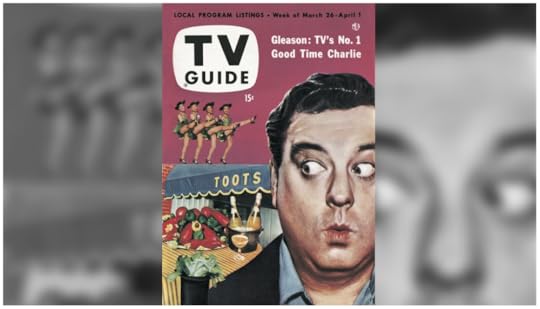
 It really is difficult sometimes to explain the effect certain people have had on television history. Not because they weren't talented, or because their accomplishments transcended the medium, but because people don't remember them anymore. And that can be difficult for me to understand, because to me these are historical figures, as real (though perhaps not as important) as Grant, Lee, Jackson, and Sherman are to Civil War historians. Some celebrities just have more staying power than others; Arthur Godfrey and Dave Garroway, for instance, have probably disappeared from the consciousness of most people today, and yet there's no way to tell the history of television without apportioning a large part of that story to the two of them.
It really is difficult sometimes to explain the effect certain people have had on television history. Not because they weren't talented, or because their accomplishments transcended the medium, but because people don't remember them anymore. And that can be difficult for me to understand, because to me these are historical figures, as real (though perhaps not as important) as Grant, Lee, Jackson, and Sherman are to Civil War historians. Some celebrities just have more staying power than others; Arthur Godfrey and Dave Garroway, for instance, have probably disappeared from the consciousness of most people today, and yet there's no way to tell the history of television without apportioning a large part of that story to the two of them.What about Jackie Gleason? His legacy, to the extent that it's remembered, is probably based on The Honeymooners, although film buffs will certainly remember his memorable, Oscar-nominated performance in The Hustler and his comic appearances in the Smoky and the Bandit series; others will recall that he won a Tony for Best Actor for Take Me Along, and had a series of successful, easy-listening record albums (which he supposedly arranged and conducted). And, as this week's lead story by Tom O'Malley shows, he was a larger-than-life presence off-screen as well as on: a man who, as his friends say, "really knows how to enjoy himself."
O'Malley describes Gleason as a "model of excesses," a big spender "even when he owned more bar tabs than dollar bills." Even now, when he grosses a half-million a year, one old friend bets he still hasn't got a quarter. He'll buy a thousand-dollar poodle on a whim, has (at least) 65 tailor-made suits in his closet (in three sizes, to accommodate his current weight) and "loves a good party"; he once presented a live goat to restauranteur and close friend Toots Shor because Shor "looked and smelled like one."
 Abour his weight: Fred Allen (another name sadly forgotten) once said of Gleason, "If he were a cannibal, he'd eat up the whole neighborhood." His weight fluctuates between 175 and 275, and he's known for his "much-publicized" trips to the hospital to starve it off; producer Jack Hurdle says Gleason "has to be tied down" to lose weight. But he makes sure that those 65 suits can handle it; he designs his clothes himself and has his tailor keep the "Jackie Gleason Drape" exclusive to him.
Abour his weight: Fred Allen (another name sadly forgotten) once said of Gleason, "If he were a cannibal, he'd eat up the whole neighborhood." His weight fluctuates between 175 and 275, and he's known for his "much-publicized" trips to the hospital to starve it off; producer Jack Hurdle says Gleason "has to be tied down" to lose weight. But he makes sure that those 65 suits can handle it; he designs his clothes himself and has his tailor keep the "Jackie Gleason Drape" exclusive to him.Part one of this three-part profile concludes by noting that all those friends who helped Gleason through the hard times, letting him roll up enormous tabs, knew their man. "The paid tabs are all torn up and now one of the softest touches in the business is Gleason himself."
I simply can't imagine what Gleason would have been like in the era of social media, of TMZ and E! and Entertainment Tonight. Would he still be the lovable bon vivant (warts and all) that we read about here, would he still be able to count on his chums in the media to be his co-conspirators (and frequently partners in crime)? Would he, possibly, be even bigger than he is now? Would he be as famous today as "real" housewives and celebrity sisters who've accomplished virtually nothing in their entire lives? Or would he have been laid low by a press that thirsts for scandal and loves the smell of blood, even if they have to inflict the cuts themselves? Would his relationship with them be acrimonious, contentious, punching out photographers? I'm not sure we'll ever know, but I'm not sure we'll ever have the larger-than-life figures like Jackie Gleason. To paraphrase The Great One himself, "Away they went."
l l l
Speaking of Arthur Godfrey, as we were up there, the two primetime "Godfrey Shows" Arthur Godfrey and His Friends and Arthur Godfrey's Talent Scouts, are the subjects of this week's unbylined review. The review speaks of Godfrey as a man "who takes up more air space on both radio and TV than most mortals have time to keep track of" (Arthur Godfrey Time, his Monday-Thursday morning show, isn't included in this review; see what I mean about Godfrey's place in TV history?); even though Godfrey's been a lightning rod for controversy since sacking Julius La Rosa last year, The Old Redhead has so far maintained his popularity and it's no wonder, since "[Godfrey's] charm has an almost mesmerizing effect on almost every viewer in the land over 41, and a good many under."
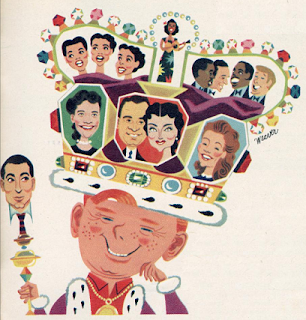 As the first program's title suggests, Godfrey still has a lot of "friends," including singers Frank Parker, the McGuire Sisters, Marion Marlowe, Lu Ann Simms, and announcer Tony Marvin, but with the exception of Parker, the rest of the regulars "bear a strong resemblance to small children doing their Sunday afternoon recitation piece for a kindly but nonetheless exacting grandfather." They owe their success to him, though; "Only Godfrey, America’s No. 1 salesman, could have taught the newcomers the essentials of showbusiness, made them work at swimming, dancing and even ice-skating, and sold them to a doting public."
As the first program's title suggests, Godfrey still has a lot of "friends," including singers Frank Parker, the McGuire Sisters, Marion Marlowe, Lu Ann Simms, and announcer Tony Marvin, but with the exception of Parker, the rest of the regulars "bear a strong resemblance to small children doing their Sunday afternoon recitation piece for a kindly but nonetheless exacting grandfather." They owe their success to him, though; "Only Godfrey, America’s No. 1 salesman, could have taught the newcomers the essentials of showbusiness, made them work at swimming, dancing and even ice-skating, and sold them to a doting public."Talent Scouts, described as "a sort of amateur-professional talent show which, under the aegis of anyone else but Godfrey, undoubtedly would have died a Potter’s Field death long since," is exactly what it sounds like. Three amateur performers are presented each week, introduced by their sponsors, with the winners selected by audience reaction. It may not sound like much, but this simple formula was, nevertheless, a great success; as Talent Scouts ran on radio and television from 1946 to 1958. And the list of participants is impressive: the McGuire Sisters joined Godfrey and His Friends after winning here, as did Pat Boone; other contestants included Tony Bennett, Don Knotts, Leslie Uggams, Jonathan Winters, Eddie Fisher, Lenny Bruce (!), Connie Francis, and more.
You might wonder why I'm spending as much time on this review as I am, given that it might not seem all that interesting (at least in comparison to Cleveland Amory's witty columns). Well, you have to remember that Arthur Godfrey and His Friends is, at this time, the #6 show in the Nielson ratings, while Arthur Godfrey's Talent Scouts is #3. You can't underestimate Godfrey's popularity, nor his impact on television (and radio). It really is quite remarkable, and for those not familiar with him (a number that, sadly, continues to grow) it may seem unfathomable, given his lack of obvious talent. Godfrey had three things going for him, though: an avuncular, folksy personality to which viewers quickly warmed; his ability as one of the medium's greatest salesmen (sponsors loved him); and a shrewd eye for appraising and developing talent. In terms of a ubiquitious presence, maybe Regis Philbin compares to him, but it really is difficult to imagine another Arthur Godfrey today. Maybe you have some suggestions.
l l l
I promise I didn't make this up, but when you're talking about television history and looking at an issue from the early 1950s, the time when most TV pioneers were active, I suppose it's inevitable: in that first paragraph today I mentioned both Arthur Godfrey and Dave Garroway; having just looked at the Godfrey story, who should pop up now but the Master Communicator himself, Garroway?
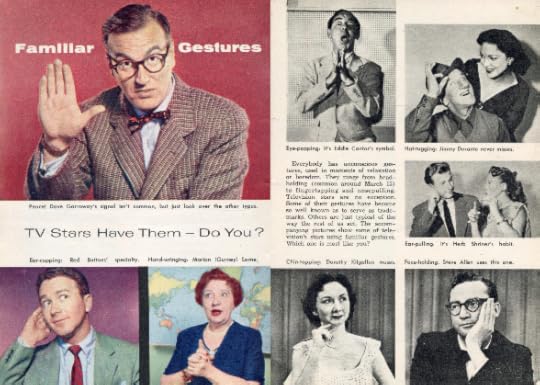
To be fair, Garroway is just one of many celebrities pictured here, recognizable for their various hand gestures (I wonder where Jack Benny's "Well!" is, by the way), but it's obvious that his "Peace" is first among equals. (He also has a pair of shows; in addition to Today, he hosts the primetime Dave Garroway Show on Friday nights.) More than anything else, I think this reminds us of the visual nature of television, and that it's still a new thing; in 1954 it's exciting to think that you can actually see these stars in your own home!
l l l
Some scattered notes from the week:
We've got another one of those two-network spectaculars this Sunday, with General Foods celebrating their 25th anniversary by purchasing 90 minutes (8:00-9:30 p.m. CT) on both CBS and NBC for highlights from the musicals of Richard Rodgers and Oscar Hammerstein II*. If you're a fan of musicals, you'll be bowled over by the productions: Oklahoma, Carousel, Allegro, South Pacific, The King and I, and Me and Juliet. (Even yours truly, who does not consider himself a fan of musicals, recognizes four of these.) The talent isn't bad either: Gordon MacRae, Jan Clayton, John Raitt, Mary Martin (who also hosts), Yul Brynner, Rosemary Clooney, and Tony Martin are among the performers, and special guests include Jack Benny, Groucho Marx, Ed Sullivan, and Edgar Bergen. Not a bad lineup at all; I'm betting it won its timeslot. You can see a portion of the show here .
*Interestingly enough, because I'm always curious about these things, the always-reliable Wikipedia says this was aired on all four networks (including DuMont). I suspect this information came from IMDb, which seems to be the source for similar writeups, and I wasn't sure what to think until I came across this contemporary account from Time, which collaborates the four-network broadcast. (And that's why I take the extra step sometimes.) General Foods must have added DuMont and ABC at the last minute, although I'm not sure what they gained from the two least-watched networks on television.
 Monday's Voice of Firestone (7:30 p.m., NBC) features 16-year-old Elizabeth Evans of Akron, Ohio, winner of the Eighth Annual Voice of Democracy Contest for high school students, repeating her essay "I Speak For Democracy" in response to viewr requests. Having scored a major triumph with my research on the General Foods special, it seemed like a good idea to follow it up and check this out as well*. Elizabeth Ellen Evans was one of four winners of the contest, all of whom received prizes of $500 college scholarships and trips to Washington, D. C. I'm guessing Elizabeth may have been chosen to appear on Voice given her hometown, Akron, which was also the home of Firestone Tire and Rubber Company. The show's musical numbers include "The Lord's Prayer," "Land of Hope and Glory," and "Stars and Stripes Forever," which I imagine were performed in the same segment. You can read the entire essay here; I wonder if you could read something like this on network television today.
Monday's Voice of Firestone (7:30 p.m., NBC) features 16-year-old Elizabeth Evans of Akron, Ohio, winner of the Eighth Annual Voice of Democracy Contest for high school students, repeating her essay "I Speak For Democracy" in response to viewr requests. Having scored a major triumph with my research on the General Foods special, it seemed like a good idea to follow it up and check this out as well*. Elizabeth Ellen Evans was one of four winners of the contest, all of whom received prizes of $500 college scholarships and trips to Washington, D. C. I'm guessing Elizabeth may have been chosen to appear on Voice given her hometown, Akron, which was also the home of Firestone Tire and Rubber Company. The show's musical numbers include "The Lord's Prayer," "Land of Hope and Glory," and "Stars and Stripes Forever," which I imagine were performed in the same segment. You can read the entire essay here; I wonder if you could read something like this on network television today.*That same research revealed that Elizabeth's essay was recited at least one other time on television, by Susan Huskisson, Miss Teenage Knoxville, Tennessee, on the September 28, 1968 episode of The Lawrence Welk Show. I'd imagine this wasn't the only time it was repeated on TV.
On Tuesday's Today (7:00 a.m., NBC), "William Buckley, author of God and Man at Yale, discusses his new book, McCarthy and His Enemies." Buckley, only 29 at this point, is the l'enfant terrible of the burgeoning conservative political movement; at a time when there was no significant intellectual conservatism, he becomes one of the most prominent public intellectuals on the scene. I don't have to do extra research here because I have both of these books; Buckley was a major influence on me at a time when I was just beginning to appreciate the intellectual aspect of politics. I still enjoy reading his earlier stuff, even though I think he went soft later on and sided too much with the neocons.
One other note: on Wednesday, Arlene Francis takes her Home show on the road (10:00 a.m., NBC) for its first color broadcast, from Washington D.C. ("under the cherry blossoms.") Highlights include girls from the Japanese Embassy showing off authentic costumes, a preview of the Mayflower Hotel spring fashion show, and a demonstration of the care of cherry trees. Things aren't all lightness and grace, though; Filmed overhead views of Washington's slums will be followed by Arlene showing scale models of plans for slum clearance. Lord only knows how well that turned out. We don't mention Home much except for the daily listings, but it's part of Pat Weaver's dawn-to-midnight programming for NBC viewers: Today, Home, and Tonight.
l l l
Boxing (along with wrestling) helped create early television—at one time, there were as many as six prime-time bouts a week, and there are five on this week—but now we're seeing some of the drawbacks of the mutual enrichment that came from that relationship. Two separate sources report that the upcoming heavyweight championship fight between Rocky Marciano and Ezzard Charles will not be shown on home television; the rights instead have been granted to Theater TV, which will show the fight in 61 theaters in 45 cities nationwide; those living outside of that select availability will have to be content to listen to the fight on network radio. It's the start of a trend that will grow in the years ahead; even as overexposure leads to the steady decline of boxing on network television, major bouts will migrate to theater broadcasts, and later to home pay-per-view. Nowadays it makes news when a major title fight is on free home TV.
 More sports: the baseball season starts next month, and the legendary sportswriter (and TV Guide columnist) Red Smith has his picks for the season. In the American League, the New York Yankees are going for their sixth consecutive World Series victory, and as Red sees it, "if the Yankees are to be beaten, they must beat themselves." Their opponents in the last two Series, the Brooklyn Dodgers, can expect stiffer opposition in the National League, but none of their challengers have "the superb balance expected of Brooklyn." Smith is a little off on his predictions this season: he feared that none of the Yankee rivals had done anything to challenge them, but the Cleveland Indians do exactly that, winning an American League-record 111 games and romping to the pennant; meanwhile, the New York Giants, picked to finish fourth by Red, take the National League title and then shock the Indians with a four-game sweep to win the Series. As a modern-day footnote, you've probably read about the pending collapse of regional sports channels and how it might affect the broadcasting plans for several teams, so I thought you might like to teams treated local television coverage back in 1954.
More sports: the baseball season starts next month, and the legendary sportswriter (and TV Guide columnist) Red Smith has his picks for the season. In the American League, the New York Yankees are going for their sixth consecutive World Series victory, and as Red sees it, "if the Yankees are to be beaten, they must beat themselves." Their opponents in the last two Series, the Brooklyn Dodgers, can expect stiffer opposition in the National League, but none of their challengers have "the superb balance expected of Brooklyn." Smith is a little off on his predictions this season: he feared that none of the Yankee rivals had done anything to challenge them, but the Cleveland Indians do exactly that, winning an American League-record 111 games and romping to the pennant; meanwhile, the New York Giants, picked to finish fourth by Red, take the National League title and then shock the Indians with a four-game sweep to win the Series. As a modern-day footnote, you've probably read about the pending collapse of regional sports channels and how it might affect the broadcasting plans for several teams, so I thought you might like to teams treated local television coverage back in 1954.l l l
Finally, how about some food? This era of TV Guide includes an occasional feature on regional recipes, provided by hosts of local television programs from around the country. This week we're in the Midwest, and Anne Hayes, host of Today's Woman on KCMO-TV in Kansas City, Missouri, has a recipe for Mid-America Beef Potpie. "I've always found that my listeners and viewers prefer menus typical of the average American family," she says, and "Mid-America Beef Potpie" is the very spirit of the Midwest. It’s easy to prepare and delicately spicy."

As always, if anyone tries this out let us know. TV
Published on March 25, 2023 05:00
March 24, 2023
Around the dial
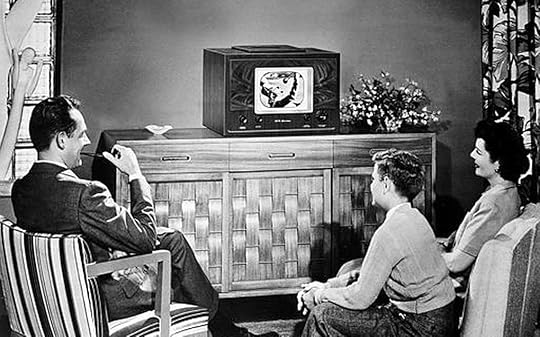
 Let's start things off this week at bare-bones e-zine, where Jack's Hitchcock Project moves to the first of two scripts by Lou Rambeau: "
Hangover
," from December, 1962, starring Tony Randall and Jayne Mansfield. While I'm offended that it features an alcoholic whose first name is Hadley, it sounds like a terrific, sinister episode.
Let's start things off this week at bare-bones e-zine, where Jack's Hitchcock Project moves to the first of two scripts by Lou Rambeau: "
Hangover
," from December, 1962, starring Tony Randall and Jayne Mansfield. While I'm offended that it features an alcoholic whose first name is Hadley, it sounds like a terrific, sinister episode.At Realweegiemidget, Gill goes all the way back to 1981 and the glory days of prime time soaps, with the first episode of Falcon Crest , "In His Father's House," with Jane Wyman, Robert Foxworth, Susan Sullivan, and Lorenzo Lamas heading a cast that never, in the show's nine seasons, would lack for big names.
We've discussed the ABC Movie of the Week many times here; it remains a popular topic among classic TV fans, and at Classic Film & TV Café, Rick looks at one of the more unusual entries in the series: Goodnight, My Love , Peter Hyams' neo-noir starring Richard Boone and Michael Dunn, with Barbara Bain as the femme fatale and Victor Buono as Sidney Greenstreet. Talk about great casting!
At Comfort TV, David makes me envious with his look back at close encounters with classic TV stars . It's an impressive list—I'm going to make you go over there and read it, because I don't want to pick and choose names—and I wish I could relate some experiences like that. I've seen many over the years, but the only one I've ever talked with was Gary Lockwood, who was very conversational.
John continues his series on 1980s TV at Cult TV Blog with a review of The Chinese Detective , and if you know anything about British TV and still don't remember this, it's because it's virtually impossible to find. Read what John has to say about this British-Chinese detective (David Yip) who has to battle both crime and racism on the mean streets of London's east end.
Here's the kind of story I enjoy: at the Washington Post, Benjamin Dreyer writes on HBO's reimagined Perry Mason, and the difficulty the series sometimes has with making sure the dialogue is period-authentic . I wrote about a similar article several years ago regarding Mad Men; it's another way we see the eternal challenges of viewing the past through the prism of the present.
What does Rod Serling mean to you? That's the question that Paul's asking at Shadow & Substance, with a story on efforts to erect a statue of Rod Serling in his hometown of Binghamton, NY—and how you can help. I submit it for your approval.
I've poked fun at television's attempts in the late 1960s and early '70s to be "with it"; sometimes, as in a series like Judd for the Defense, tackling current issues worked, but more often, the attempts were wince-inducing. Terence looks at the 1970-71 season at A Shroud of Thoughts, and finds that "relevant" TV didn't particularly translate to "successful" TV.
Finally, at TVParty, Cary O'Dell writes about those shows that went just one season too many . For some it will be a painful reminder of a favorite show that went, in Cary's words, "off the rails," while other examples will just confirm what you knew all along. In any case, it proves the old adage that you should always leave them wanting more; I hope we don't outstay our welcome here! TV
Published on March 24, 2023 05:00
It's About TV!
Insightful commentary on how classic TV shows mirrored and influenced American society, tracing the impact of iconic series on national identity, cultural change, and the challenges we face today.
- Mitchell Hadley's profile
- 5 followers



